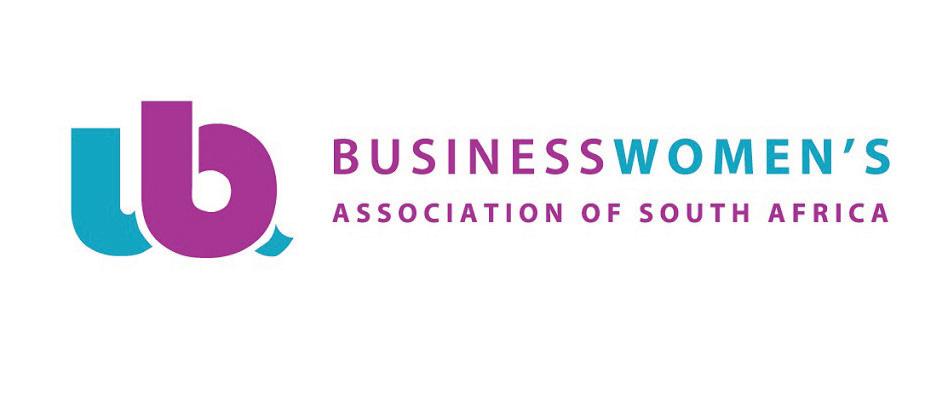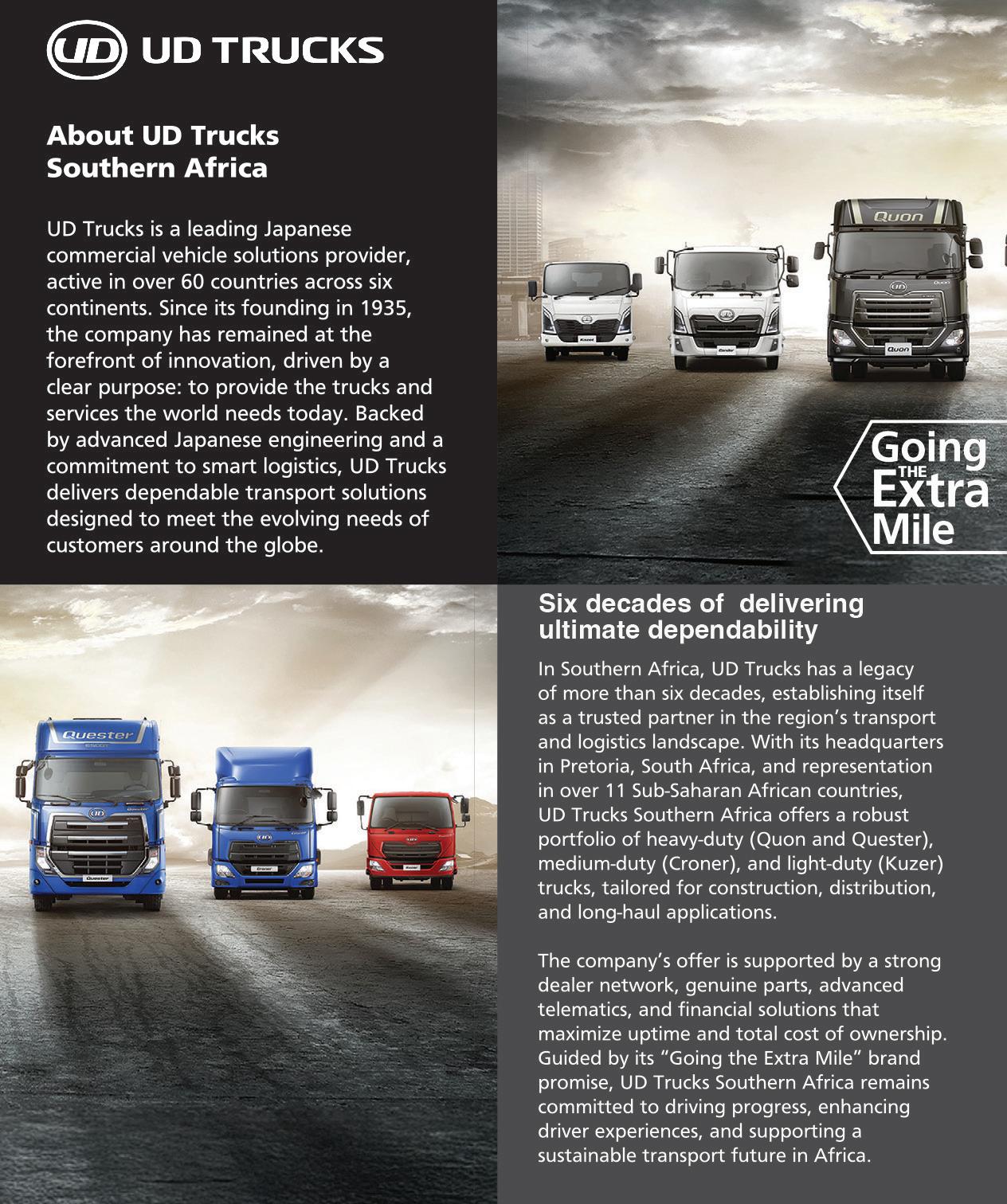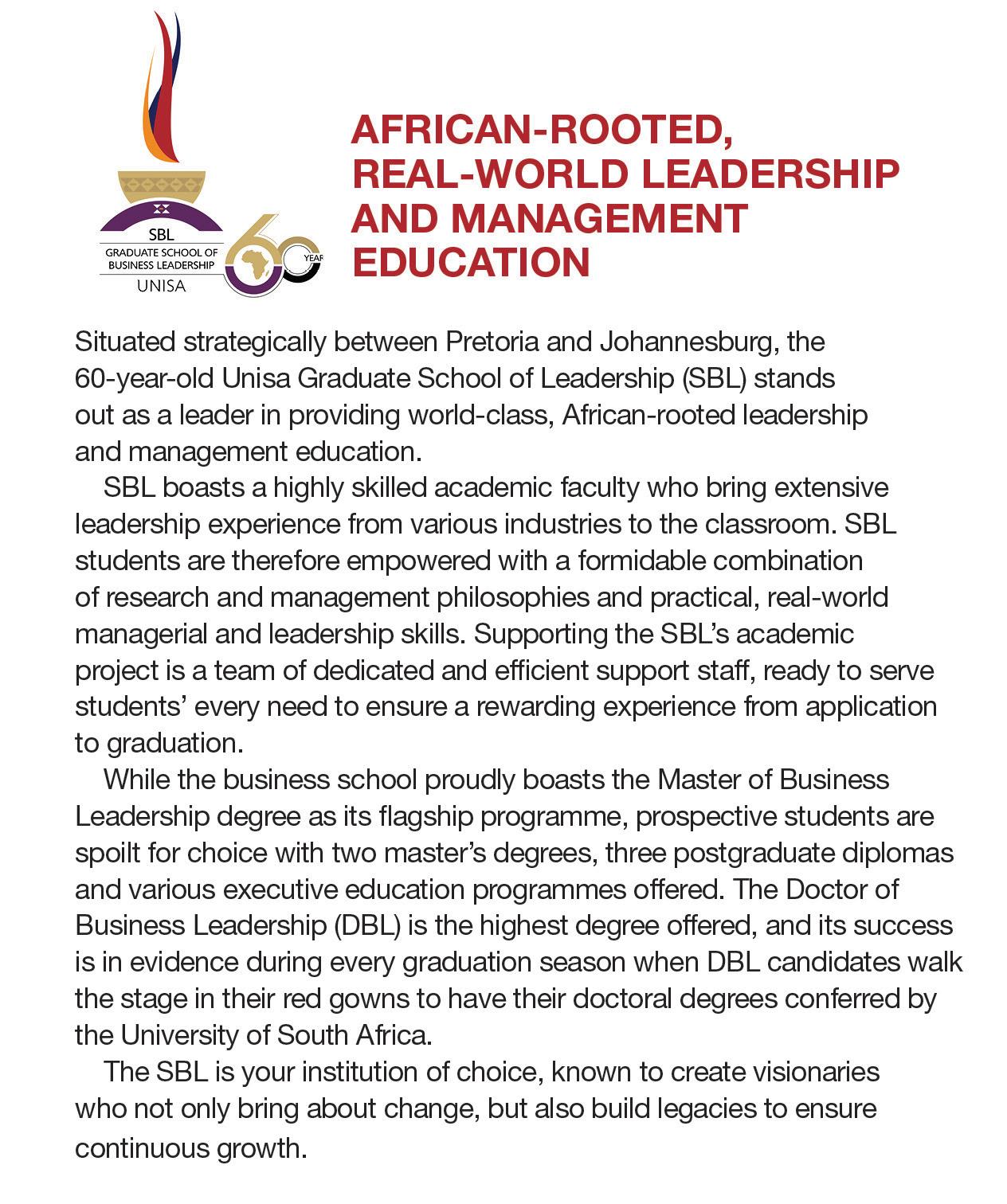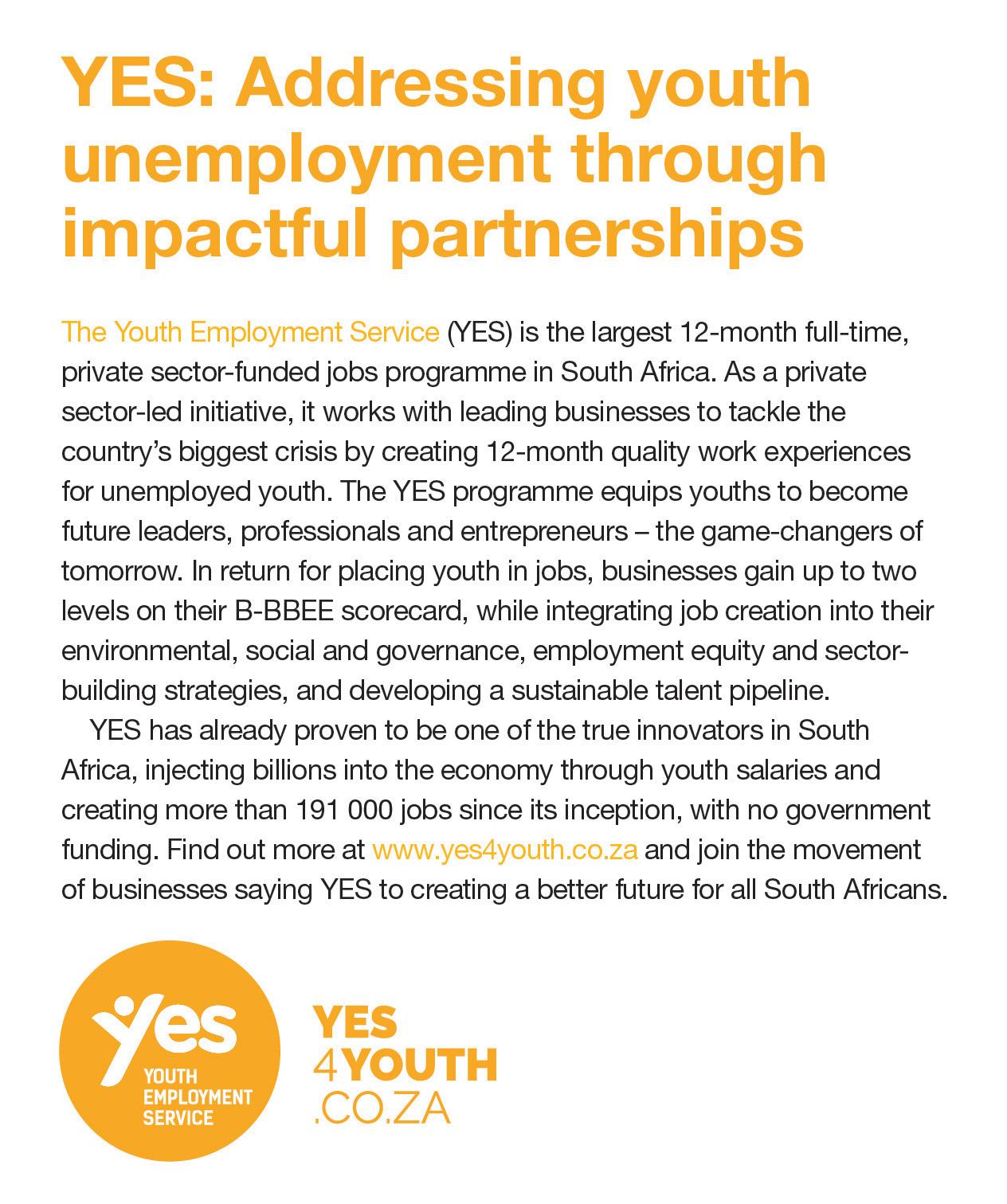






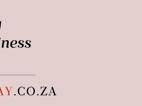


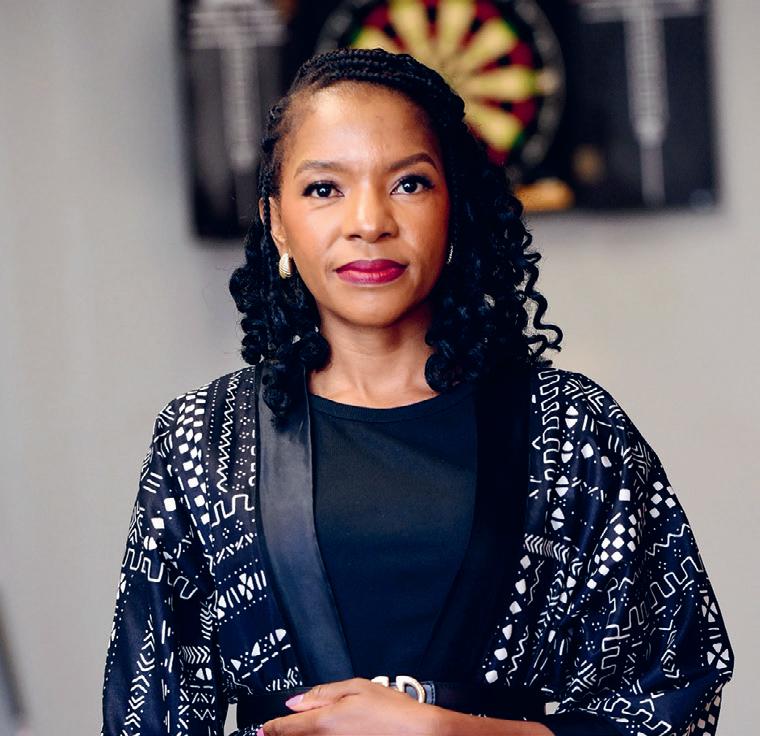









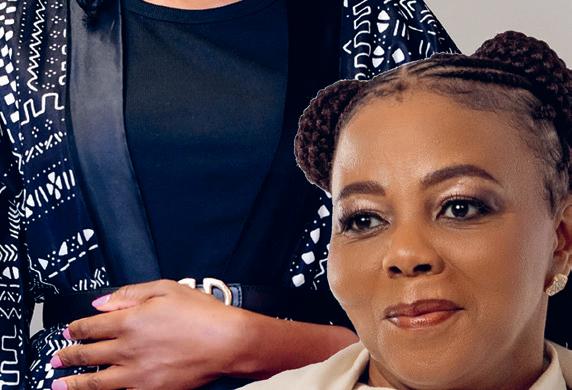
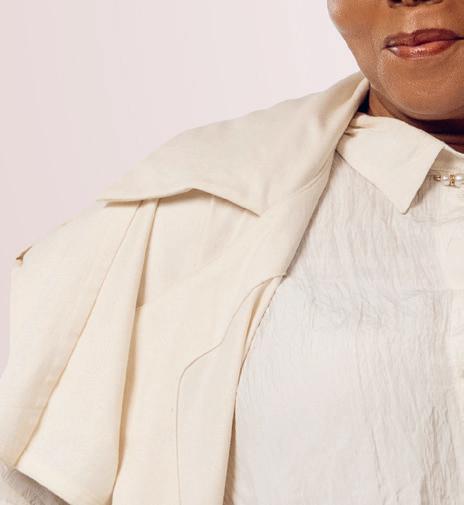


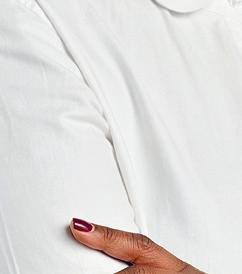





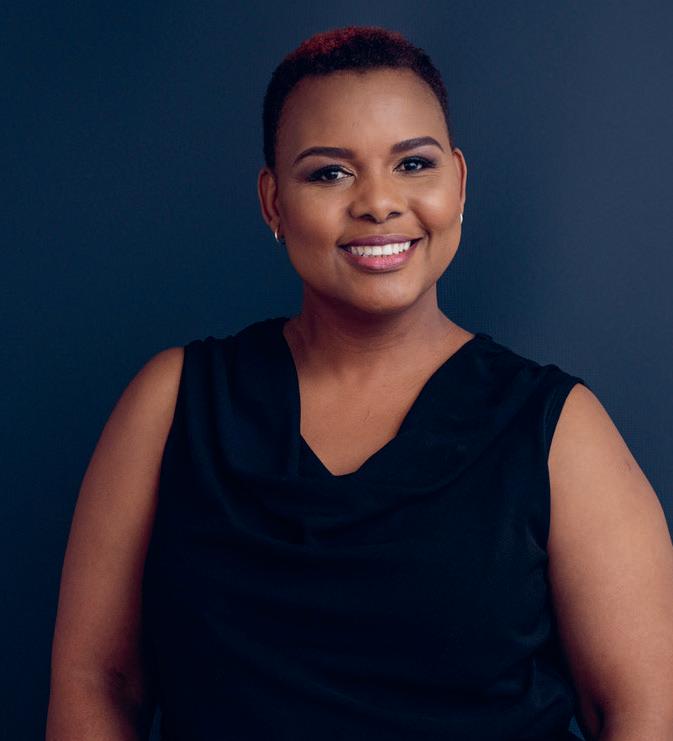



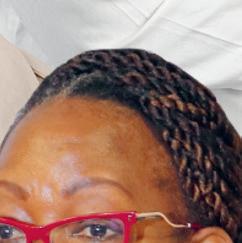



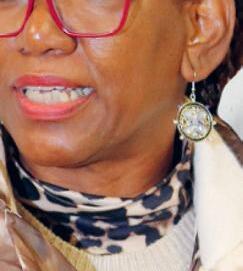







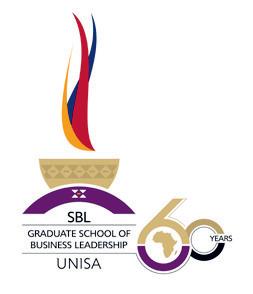













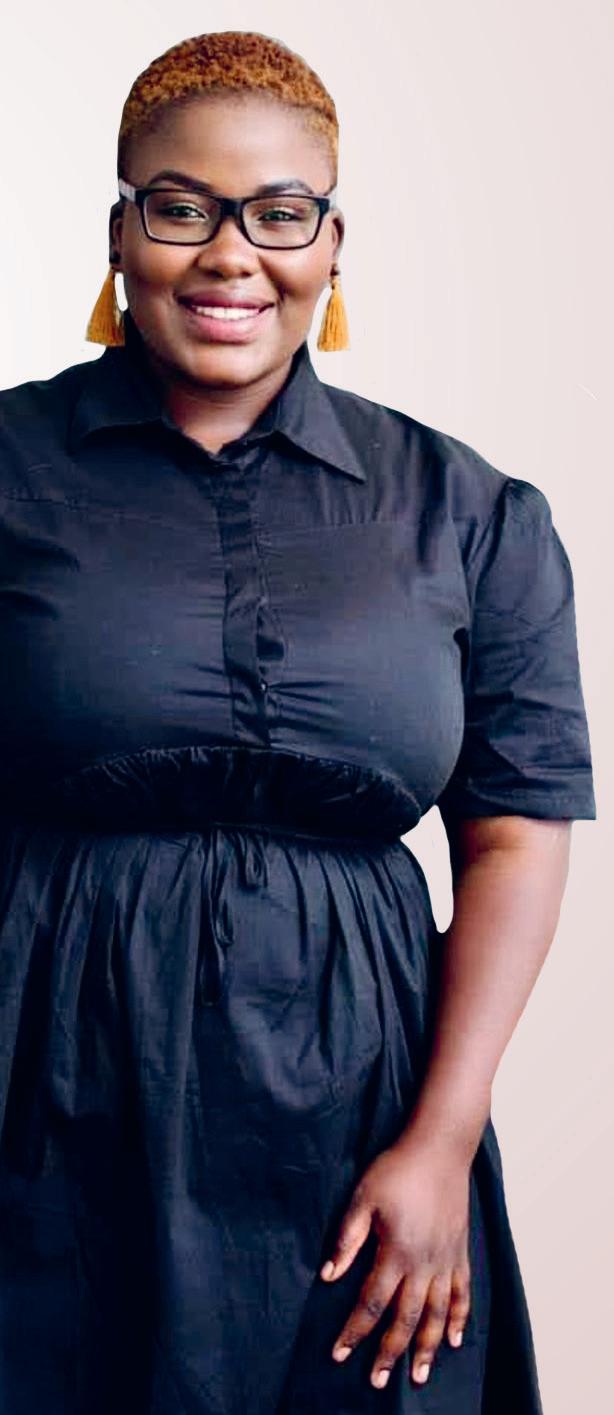
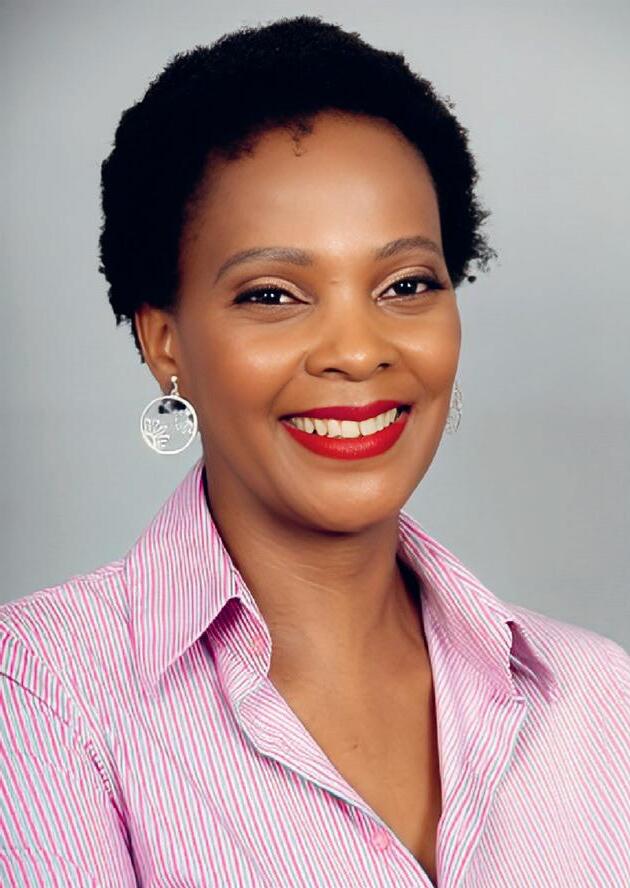


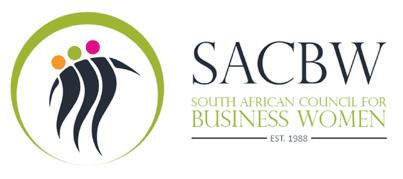
























































































FNB believes in empowering women to lead and shape strategy within the organisation. The bank asked Nicole Sykes, Head of Women in Business at FNB, to reflect on her career in an evolving industry
What has helped you grow your career in finance and leadership, and what key lessons have you learned?
Being deeply curious and willing to learn from others has shaped my journey. Working across corporate and entrepreneurial ecosystems taught me agility and how to bridge structured systems with the realities of business owners. Strong mentors helped shape my thinking, but lessons from small business owners and team members were just as powerful. Growth happens when you stretch into discomfort –that’s where con dence is built. I’ve also learned to be brave, trust my voice and back my decisions.
What achievements at FNB and FirstRand are you most proud of?
I’m proud of building and leading Women in Business at FNB, not just as an initiative, and a business imperative, also as a growing ecosystem that creates real opportunities for women, to give them more support and access to markets.
A major milestone has been seeing the internal culture shift. Supporting women entrepreneurs is now seen as core to driving inclusive growth, not a side initiative.
What are some of the major leadership challenges in your industry, and how do you navigate them?
Leading through complexity and constant change, especially in a fast-evolving sector like nance, is a key
challenge. Whether it’s ntech disruption or regulatory shifts, staying aligned with long-term strategy while adapting in real time is essential.
I focus on purpose and people. I combine collaboration and data-driven decisions with intuition, which is often overlooked but incredibly valuable in leadership.
How would you describe your leadership style?
My leadership is people-centred, intentional and purpose-driven. I lead with empathy and vision, but also challenge people to grow because I believe in their potential. What makes it effective is authenticity. I show up consistently, whether I’m in a boardroom or mentoring over coffee. That builds trust – the foundation of innovation and performance.
What advice would you give aspiring leaders?
Take risks and back yourself. You won’t have everything gured out before an opportunity comes. Leadership is learned in the doing – in pressure, pivot points and uncertainty.
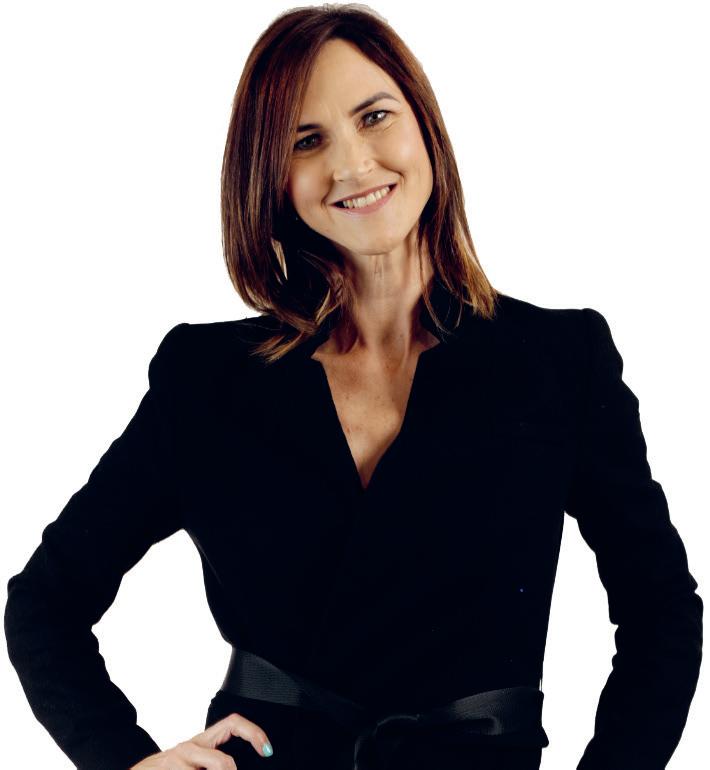
Find people who believe in your potential, but also continue re ecting on the impact you want to make. Surround yourself with those who’ll hold you accountable to that growth.
How has mentorship shaped your journey, and how do you pay it forward?
Mentorship has been foundational. I’ve had mentors who
“MY LEADERSHIP IS PEOPLE-CENTRED, INTENTIONAL AND PURPOSE-DRIVEN. I LEAD WITH EMPATHY AND VISION, BUT ALSO CHALLENGE PEOPLE TO GROW BECAUSE I BELIEVE IN THEIR POTENTIAL.”
– NICOLE SYKES
challenged and guided me, and I aim to do the same for others – both formally and informally. Mentorship is about presence and role-modelling. Visibility matters. Future leaders are watching us, and we owe them authenticity and generosity with our stories.
What trends will shape the finance industry next?
Digital transformation, arti cial intelligence and inclusive nance will lead the way. Customers want smarter, tailored solutions, but also institutions that understand them. Values-based banking – with a focus on sustainability and inclusion – will de ne future success.
What keeps you focused and effective?
Daily re ection, purpose and community. I prioritise resilience and rest because leadership is a marathon. Integrity, courage and empathy are the values that guide me daily.







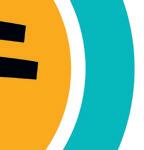

FNB SHINES THE SPOTLIGHT ON FOODABLE, A TECH START-UP FOCUSED ON SUSTAINABLE FOOD ACCESS AND WASTE REDUCTION . The bank chats with Tumisho Thobejane, co-founder & CEO of Fooddable, to find out more about her venture
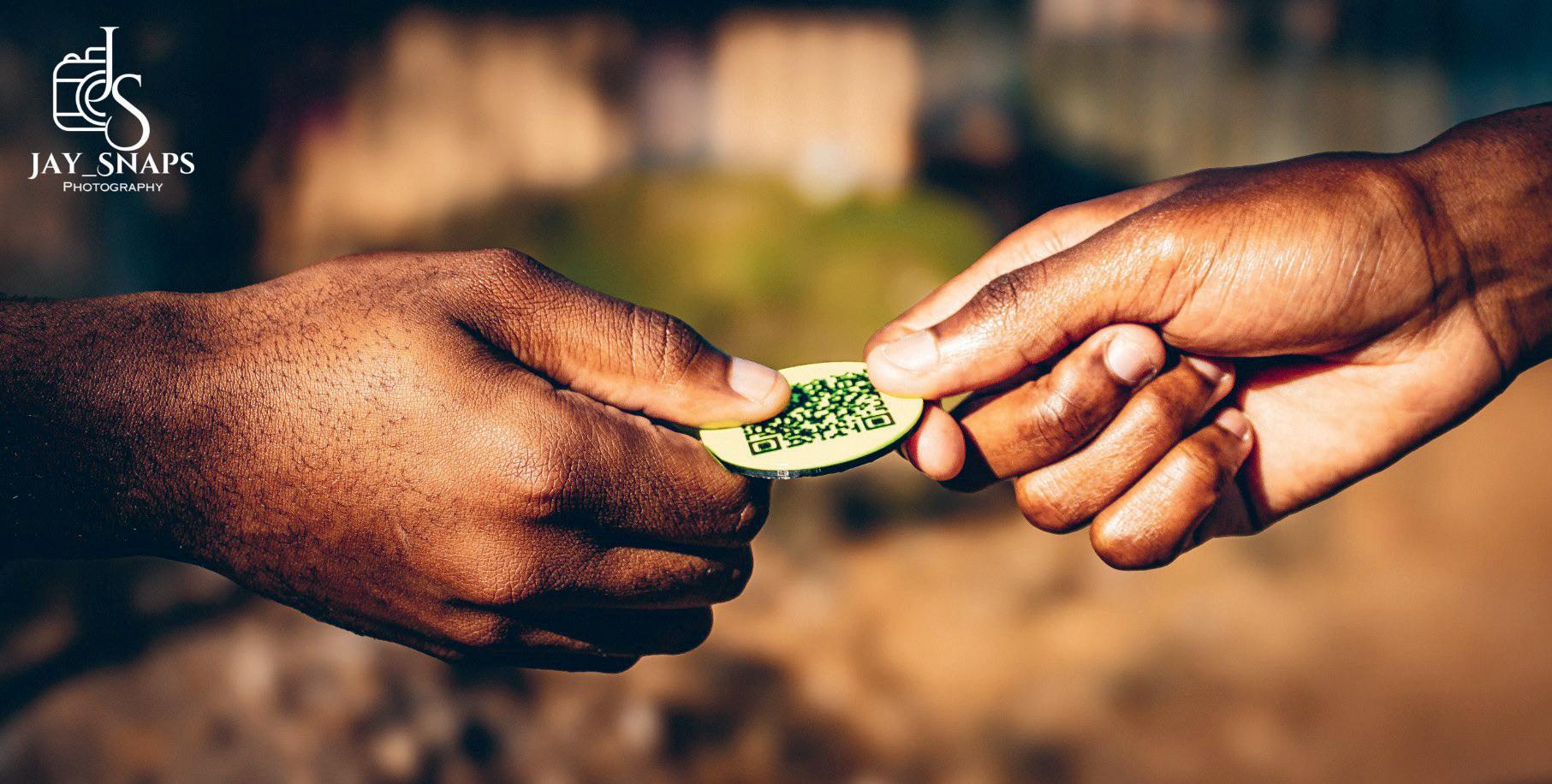
Tumisho Thobejane is a social entrepreneur and biomedical technology graduate from the Vaal University of Technology. She founded Fooddable, a tech-driven start-up that partners with restaurants to turn surplus food into affordable, traceable meals – redeemable via QR codes.
Thobejane’s work focuses on sustainable food access, reducing waste and restoring dignity to underserved communities. She has represented South Africa on global platforms, including the Global Student Entrepreneur Awards and the World Expo.
What inspired you to start Fooddable, and what problem were you hoping to solve?
Growing up in a township showed me the value of food beyond survival; it’s about dignity and connection. Seeing restaurants discard edible food while people nearby went hungry inspired me to create Fooddable, which bridges that gap using tech.
What are some of your proudest moments with Fooddable?
Representing South Africa at the Global Student Entrepreneur Awards nals in Japan
and being recognised among the top six global student entrepreneurs was a standout moment for me. It validated Fooddable’s impact and gave us a platform to tell our story.
What challenges have you faced as a woman in tech and food, and how did you overcome them?
Being young and female in male-dominated spaces meant I often had to prove myself twice. Accessing funding was tough, but mentorship, networks like EO and consistent results have helped me build credibility.
What values guide you as a leader and entrepreneur?
Human dignity is at the core of everything I do. I believe business should serve society and innovation should solve real problems sustainably.
How do you manage the pressures of running a business?
Martial arts and journalling keep me grounded. I’ve also built a strong, values-aligned team that shares the load and the organisation’s vision.
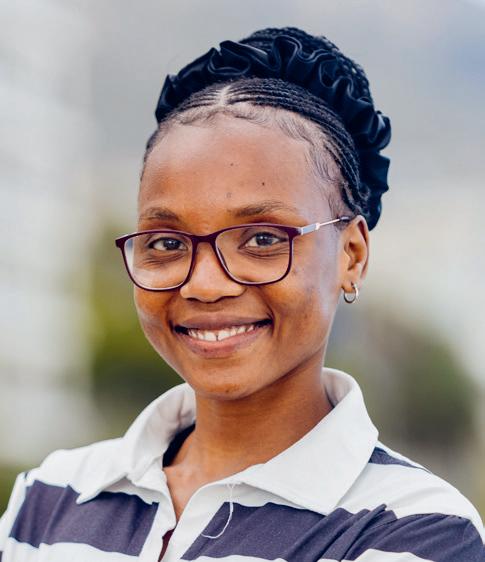
“HUMAN DIGNITY IS AT THE CORE OF EVERYTHING I DO. I BELIEVE BUSINESS SHOULD SERVE SOCIETY, AND INNOVATION SHOULD SOLVE REAL PROBLEMS SUSTAINABLY.”
– TUMISHO THOBEJANE
What advice would you give to young women starting their own businesses? Start small and focus on solving a real problem. Don’t wait to be ready – just be resourceful. Build a network that supports and challenges you.
Who is Tumisho Thobejane outside of work? I’m a martial artist and a music lover. I enjoy trying new cuisines, fun sports and anything that keeps me moving and inspired.
FNB has shown support for Fooddable’s mission – what excites you about that? That it offers strategic guidance and credibility. The bank’s understanding of impact-led businesses is helping us grow through access to markets, mentorship and aligned values.









South African Council for Business Women president DR ZIVA SPANGENBERG affirms the power of women and diversity of thought as essential drivers of innovation, empowerment and long-term economic transformation
Diversity of thought is one of our core objectives as we believe innovative solutions emerge when we bring together different perspectives, experiences and ways of thinking. We are committed to fostering diversity of thought by cultivating an inclusive environment where individuals feel empowered to share unique viewpoints and challenge conventional ideas. Diverse thinking drives innovation, strengthens decision-making and reflects the complexity of the world we serve. Apart from diversity of thought, we are committed to the empowerment and advancement of women in a variety of industry sectors through several impactful initiatives:
• Bursary Fund for Matric Girls: this visionary programme is designed to empower Grade 12 girls with real-world exposure, mentorship and financial support to pursue careers in business and ultimately change the trajectory of their lives.
• Annual Recognition Awards: celebrate the achievements of outstanding women entrepreneurs who are making significant contributions in their fields, inspiring others to follow in their footsteps. A key highlight of the awards ceremony is the Business Woman of the Year category, which recognises an exceptional female leader whose leadership has transformed both her business and the lives of her team.
• Academy Leadership Course: equips women with essential leadership skills through a comprehensive development programme designed to foster confidence, strategic thinking and career and business growth. With a 37-year legacy of excellence, we are continually seeking new opportunities to innovate and grow. These programmes are designed to nurture talent, recognise excellence and create a pipeline of empowered women poised to lead across sectors and build legacies that will inspire generations to come.
Dr Ziva Spangenberg

WE ARE COMMITTED TO FOSTERING DIVERSITY OF THOUGHT BY CULTIVATING AN INCLUSIVE ENVIRONMENT WHERE INDIVIDUALS FEEL EMPOWERED TO SHARE UNIQUE VIEWPOINTS AND CHALLENGE CONVENTIONAL IDEAS.
As part of Women’s Month, may the following declaration serve as a reminder and encouragement to women countrywide: “As a powerful businesswoman, I prioritise my physical, mental and emotional wellbeing to maintain my strength, resilience and focus in all aspects of my life. I am committed to nourishing my body, mind and spirit so I can show up fully and authentically in my business and personal relationships.
“Self-care is not selfish; it’s essential to my success as a businesswoman. I make time for activities that bring me joy, calm my mind and fuel my passions. I trust myself to make healthy choices that support my wellbeing and I honour my needs and boundaries in all areas of my life.
“As a businesswoman, I recognise that my wellbeing is my greatest asset. I invest in my physical, mental and emotional health to achieve my goals and live a fulfilling life. I am worthy of love, care and compassion –from myself and others. I prioritise my own wellness and seek support when I need it. My wellness is not a luxury, it’s a necessity. I make time for self-care, mindfulness and stress management to maintain my energy, creativity and productivity.
“I celebrate my strengths and accomplishments, and I am gentle with myself when I make mistakes. I prioritise my mental and emotional wellbeing to maintain a positive and resilient mindset.
“As a businesswoman, I know that my wellbeing is connected to my success. I prioritise activities that bring me joy, help me grow and support my overall health and happiness.
“I am a strong, capable and deserving businesswoman. I prioritise my wellness and take care of myself, so I can live a happy, healthy and fulfilling life.”
You are powerful beyond measure. Your voice matters. Your dreams are valid. May you continue to rise, lead and inspire –not only this month but every single day. Let us celebrate the strength, resilience and brilliance of women from every walk of life.
Together, we can build a future that honours equality, dignity and hope.
Follow: Dr Ziva Spangenberg www.linkedin.com/in/dr-ziva-spangenberg-3584b3303
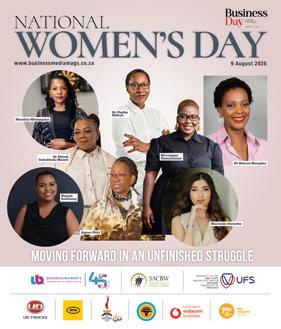
PUBLISHED BY
A proud division of Arena Holdings (Pty) Ltd
Hill on Empire, 16 Empire Road (cnr Hillside Road), Parktown, Johannesburg, 2193 PO Box 12500, Mill Street, Cape Town, 8010 www.businessmediamags.co.za
EDITORIAL
Content Manager: Raina Julies rainaj@picasso.co.za
Contributors: Marchelle Abrahams, Dr Phindi Cebekhulu-Msomi, Dr Mankodi Moitse, Dr Sharon Munyaka, Nobesuthu Ndlovu, Dr Phyllis Ndlovu, Thando Pato, Dr Ziva Spangenberg
Copy Editor: Brenda Bryden
Content Co-ordinator: Natasha Maneveldt
Online Editor: Stacey Visser, vissers@businessmediamags.co.za
Head of Design: Jayne Macé-Ferguson
Senior Designer: Mfundo Archie Ndzo
Cover Images: Supplied
SALES
Project Manager: Jacqueline Bezuidenhout jacquelineb@picasso.co.za | +27 078 172 7776 +27 072 430 9392
Sales: Gavin Payne, Tarin-Lee Watts
PRODUCTION
Production Editor: Shamiela Brenner
Advertising Co-ordinator: Shamiela Brenner
Subscriptions and Distribution: Fatima Dramat, fatimad@picasso.co.za
Printer: CTP Printers, Cape Town
MANAGEMENT
Management Accountant: Deidre Musha
Business Manager: Lodewyk van der Walt General Manager, Magazines: Jocelyne Bayer






Copyright: Picasso Headline. No portion of this magazine may be reproduced in any form without written consent of the publisher. The publisher is not responsible for unsolicited materia l. National Women’s Day is published by Picasso Headline. The opinions expressed are not necessarily those of Picasso Headline. All advertisements/ advertorials have been paid for and therefore do not carry any endorsement by the publisher.
This year’s National Women’s Day arrives as South Africa grapples with mounting economic hardship and persistent inequality. The statistics are sobering: 35.5 per cent of women are unemployed, compared to 30.7 per cent of men, and 39.8 per cent of black African women are without work – the most affected demographic in the country. Among young people aged 15–34, the youth unemployment rate sits at 46.1 per cent, re ecting a deepening crisis of opportunity, as re ected in Statistic South Africa’s Quarterly Labour Force Survey Q1 2025.
At the same time, gender-based violence remains one of South Africa’s most devastating and under-addressed issues.
In the year ending March 2024, 5 578 women and 1 656 children were murdered –gures that place South Africa among the countries with the highest femicide rates globally (SAPolice Crime Stats, Q4 2023/24). Despite national outcry and policy
2 SOUTH AFRICAN COUNCIL FOR BUSINESS
The power of women is essential for long-term economic transformation.
8 MARCH TO MOVEMENT
Dr Sharon Munyaka re ects on the 1956 Women’s March and the urgent call to elevate women’s leadership across all sectors.
9 SPIRITUAL INTELLIGENCE
In an era marked by division, Dr Phyllis Ndlovu explores how spiritual intelligence rooted in Ubuntu helps leaders nd purpose, meaning and connection in the workplace and society.
12 THE GENDER DIVIDEND
We unpack how empowering women across entrepreneurship, labour and leadership is not just a moral imperative – it’s an economic one.
16 GENDER-BASED VIOLENCE
How nancial insecurity makes women vulnerable to ongoing cycles of gender-based violence and abuse.
responses, violence against women and children continues unabated, with many survivors left without meaningful support or justice.
Yet in the face of all this, South African women continue to lead, build and rise.
In this issue, we celebrate women who are tackling some of our nation’s most urgent challenges – climate resilience, food insecurity, economic inequality – with courage and innovation. These women are not simply navigating broken systems; they are transforming them.
We revisit the legacy of the 1956 Women’s March, not as a symbolic anniversary, but as a living movement. The demands for equality, dignity and inclusion are as urgent now as they were then.
Let this Women’s Month be more than a commemoration. Let it be a recommitment to a South Africa where women are safe, valued, empowered and central to our country’s renewal.
23 GEN-Z RISING
We meet two powerful Gen-Z women under 30 who are reshaping South Africa’s future with purpose-driven ventures and a bold sense of leadership in a digital age.
24 CLIMATE RESILIENCE
Dr Phindi Cebekhulu-Msomi shares her vision for a climate-smart, food-secure future driven by women-led solutions in agriculture, energy and water.
Dr Mankodi Moitse explores how women are reshaping leadership through inclusive, sustainable approaches.
Why women in tech are vital to innovation and inclusive growth.
Insights on the critical link between mental wellness and economic growth.
Recommitted to being a powerful catalyst for change.




DR SHARON MUNYAKA, a registered industrial and organisational psychologist with the Health Professions Council of South Africa and board chair of Citizen Leader Lab, shares a powerful reflection on the 1956 Women’s March, its enduring legacy and the urgent need to support and elevate women’s leadership across education, business, government and civil society today
On Women’s Day 2025, we commemorate a defining moment in our nation’s history – the 1956 Women’s March to the Union Buildings where more than 20 000 South African women stood united against unjust pass laws. It was one of the largest protests in our country’s history and yet, too often, its meaning is confined to a ceremonial moment in our national calendar.
In truth, 1956 was never just a march – it was the beginning of a movement. A movement led by women who were denied their dignity, voice and agency, but refused to be invisible. It was women who understood that leadership is not about hierarchy, but about courage, conviction and a collective voice. Nearly 70 years later, that legacy continues to challenge us to think deeply about how we lead, who gets to lead, and what leadership must look like in a country still navigating inequality at various levels. Today, we see their spirit in the women leading movements for justice, climate action, access to health and education reform – women who are using their voices in bold, intersectional ways to challenge long-standing systems of power.
Founded in 2010, Citizen Leader Lab is dedicated to creating resilient leaders in the public and private sectors. Through leadership development programmes and workshops, it empowers individuals to be effective change agents in their communities. With 15 years of experience, Citizen Leader Lab continues to grow its presence in education and extend its influence into critical public sectors, promoting cross-sector collaboration, active citizenship and social cohesion.
At Citizen Leader Lab, our work is rooted in the belief that active ethical and empathetic leadership is essential to South Africa’s future. We develop leaders from underserved communities, with a particular focus on the public education system because we understand that system-level change only happens when people are empowered from the ground up. Women – especially black women – are central to this work, often leading in schools, homes and communities despite systemic barriers.
Sadly, despite the strides made since 1956, women in South Africa continue to face profound inequities. In business, women remain under-represented in executive roles. In government and public service, they are often under-resourced. In civil society, their contributions are frequently undervalued. The spirit of the women of 1956 requires us not just to celebrate their courage, but also to dismantle the structures that continue to limit the full expression of women’s leadership today.
Nowhere is this leadership more urgent than in our schools. Even in the face of formidable challenges, we see female principals transforming their learning environments. These women are not waiting for permission to lead. They are driving change through inclusive decision-making, community mobilisation and a deep commitment to learner outcomes.
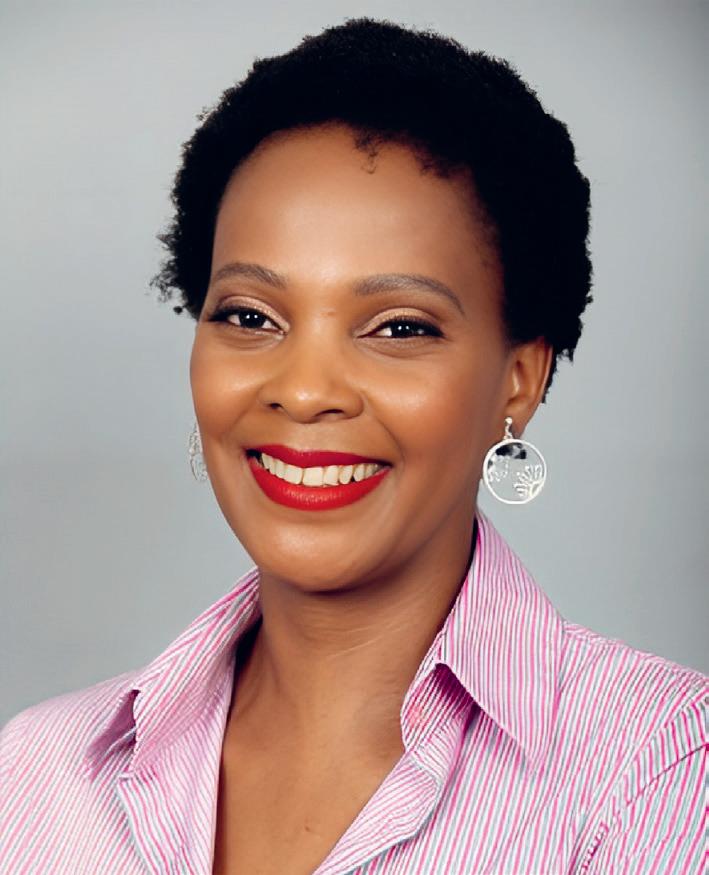
Their leadership is an extension of the spirit of 1956: bold, collaborative and grounded in justice.
As leaders in business, government, educational institutions and the nonprofit sector, we must ask: Are we building cultures that genuinely support women to thrive? Are we mentoring and sponsoring women leaders, not just acknowledging them? Are we listening to women on the ground – in communities, in schools, in civic life – and taking their solutions seriously?
The answers to these questions will determine whether 1956 remains a memory or becomes a movement that continues to shape our future. This is a call to action for all of us.
This Women’s Day, let’s move beyond tokenism. Let’s march forward toward systems that reflect the wisdom, strength and agency of South African women. Let us build ecosystems where the next generation of women leaders in every sector can rise. The legacy of 1956 deserves nothing less.
THE SPIRIT OF THE WOMEN OF 1956 REQUIRES US NOT JUST TO CELEBRATE THEIR COURAGE, BUT ALSO TO DISMANTLE THE STRUCTURES THAT CONTINUE TO LIMIT THE FULL EXPRESSION OF WOMEN’S LEADERSHIP TODAY.
Follow: Dr Sharon Munyaka www.linkedin.com/in/dr-sharon-munyaka-8b235615
In an age of polarisation, spiritual intelligence is emerging as a transformative leadership competency rooted in Ubuntu, writes DR
In an increasingly polarised world, spiritual intelligence stands out as a much-needed competency that fosters interconnectedness and a profound sense of “I am because you are” or Ubuntu, a philosophy South Africans have embraced for generations.
As a leader, spiritual intelligence is grounded in three key dimensions: having a personal sense of purpose in your role, finding meaning in life experiences and reflecting on your interconnection with others. It has been suggested that spiritual intelligence is the pinnacle of human development. It follows the evolution from physical intelligence (mastery over the body), to intellectual intelligence, to emotional intelligence – which centres on self-regulation – and finally to spiritual intelligence, which integrates the others through purpose and consciousness.
Spiritual intelligence is rooted in a sense of interconnectedness – between individuals, organisations, society, the environment and the transcendent. Spiritually intelligent leaders recognise that the elements within a corporate ecosystem are intricately connected and that each contributes value to the system’s overall effectiveness.
In this sense, “I am because you are” takes on particular relevance in the workplace. Leaders must ask themselves: What is my why? When purpose drives decision-making, actions become more meaningful, sustainable and impactful –in contrast to the transactional choices made by leaders who rely purely on intellect.
A leader’s sense of purpose shapes an organisation’s culture. When leaders understand their why, they begin to see that businesses exist not just for profit, but as part of a broader sociocultural, ecological and economic system. The goal becomes not only to be efficient internally, but also to create shared value for all stakeholders –staff, customers, communities and the environment.
Three core brain functions enable spiritual intelligence and when activated, support purpose-driven leadership:
• Holistic function: this is the brain’s capacity to perceive the whole as more than the sum of its parts. Leaders with spiritual intelligence view their organisation as one integrated system, rather than a collection of departments, fostering connection and collaboration.
• Causality: this is the brain’s ability to link cause and effect. For example, when leaders treat all stakeholders with dignity and humanity, they often see higher levels of engagement and innovation. Spiritually intelligent leaders recognise these links and lead accordingly.
• Enquiry: this is the brain’s curiosity engine – its ability to ask “what if?” By questioning the status quo, leaders open themselves to innovation and fresh ways of thinking. Asking “Is there a better way to run this business?” can shift the organisation from a survival mindset to one of thriving.
SPIRITUALLY INTELLIGENT LEADERS RECOGNISE THAT THE ELEMENTS WITHIN A CORPORATE ECOSYSTEM ARE INTRICATELY CONNECTED AND THAT EACH CONTRIBUTES VALUE TO THE SYSTEM’S OVERALL EFFECTIVENESS.
These functions underpin spiritual intelligence, empowering leaders to model a more holistic, purpose-led way of operating that can be mirrored throughout the organisation.
Leadership teams should prioritise reflection on shared purpose as much as they do bottom-line results. Some questions to bring into leadership dialogue include:
• What is our business purpose beyond profit?
• How well are we fulfilling this purpose?
• Are individuals within the organisation aligned with it?
• If not, what must we do to create alignment?
• Does society identify with the business or brand we are becoming?
These questions are not philosophical luxuries; they are strategic imperatives. Ignoring them risks stagnation or becoming irrelevant. In a world of growing inequality, companies that fail to repurpose could be contributing to their declining customer base in years to come.
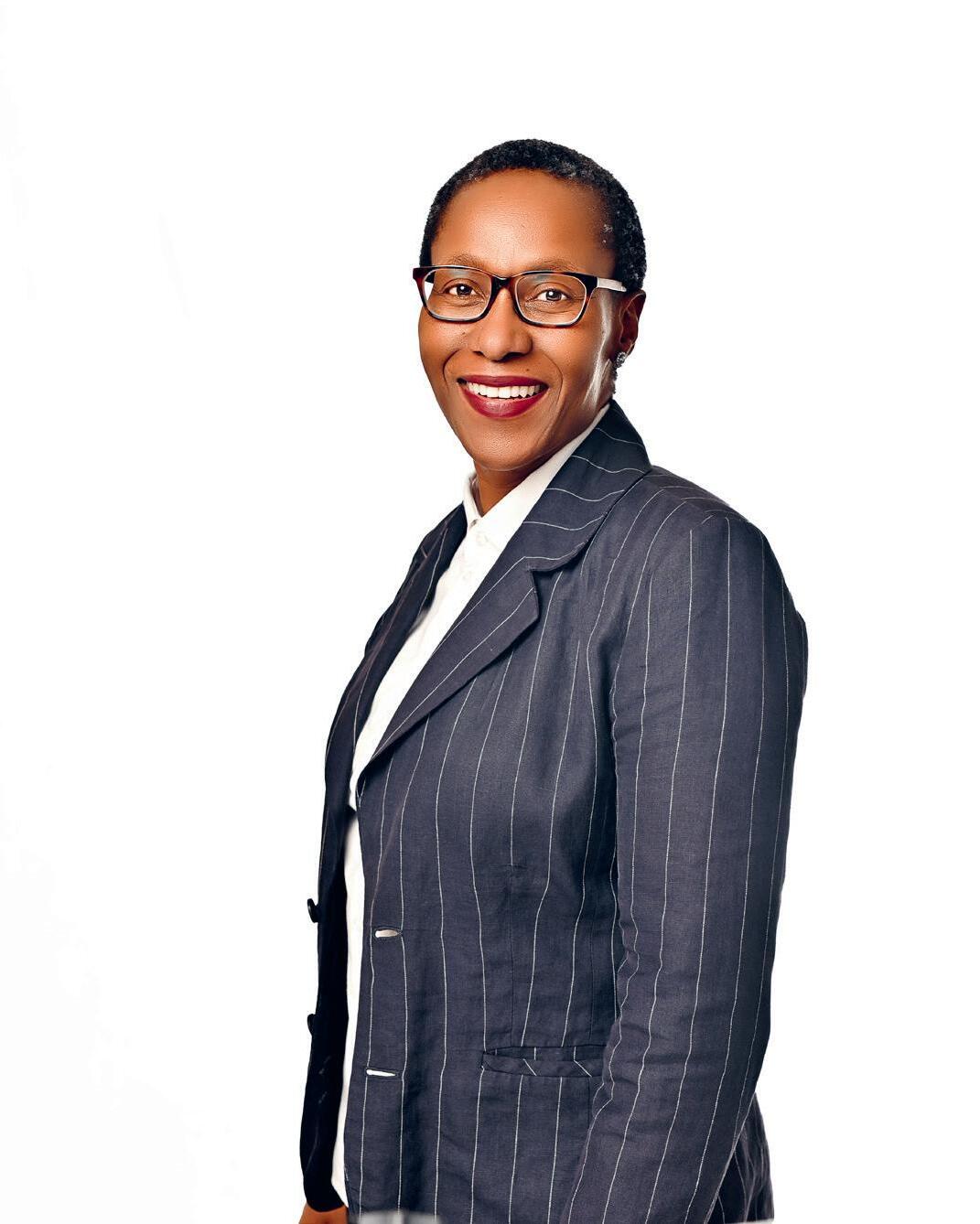
Purpose – both personal and collective – is not abstract; it is deeply practical. It shapes how we do business, treat people and impact the world.
As Africans, and especially as South Africans, we are uniquely positioned to lead with spiritual intelligence. Our cultural values, especially Ubuntu, have long championed connection, care and community. These are not just social ideals – they are competitive advantages in a changing world.
Let us disrupt our thinking and lead with purpose so we can help co-create a future for which future generations will thank us.
Dr Phyllis Ndlovu






Empowering women in the digital economy is not only about fairness, but also about unlocking untapped potential that can advance South Africa’s development, says Arthur Mukhuvha, GM of the MTN SA Foundation. “At MTN, we support women because their achievements contribute to our nation’s progress.”
Technology is reshaping how we live, work and connect. However, for the digital economy to truly thrive, it must be inclusive, where no one gets left behind. In South Africa, where women are still under-represented in the ICT sector, empowering female entrepreneurs has become both a business imperative and a powerful tool for inclusive growth.
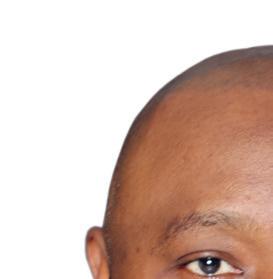
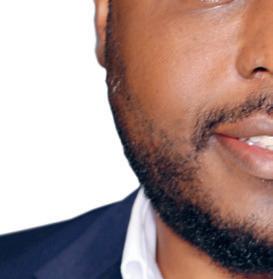
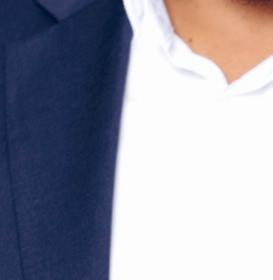



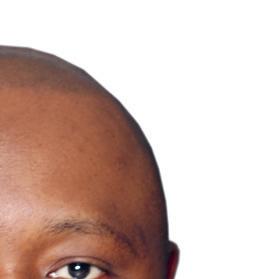
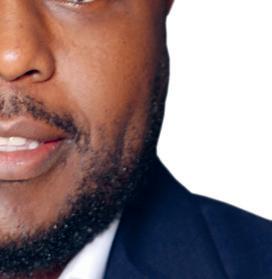










How MTN is helping women entrepreneurs lead South Africa’s digital future
Through initiatives such as the Women in Digital Business Challenge and Digital Skills for Digital Jobs, MTN is actively closing the digital gender gap by supporting women in developing innovative, scalable solutions with lasting effects. These programmes go beyond funding; they offer mentorship, digital skills training and platforms that turn big ideas into sustainable businesses.
Across the country, women are rising to the challenge, leveraging technology to solve real-world issues, grow their businesses and inspire others. Their stories demonstrate how targeted support can unlock innovation, resilience and leadership, bene tting entire communities.
These inspiring stories exemplify the impact when women are equipped with the tools to lead in the digital economy.

Kholofelo Makena spent years collaborating with nonpro t organisations (NPOs) via her foundation, Broadway Legacy, and participating in small business development programmes. She observed a common challenge: NPOs trying to perform vital work with limited digital tools, manual processes and no way to showcase impact in real-time.


“MTN’S COMMITMENT TO WOMEN-LED DIGITAL INNOVATION UNDERSCORES OUR BROADER PLEDGE TO INCLUSION, GROWTH AND SOCIAL IMPACT.”
– ARTHUR MUKHUVHA
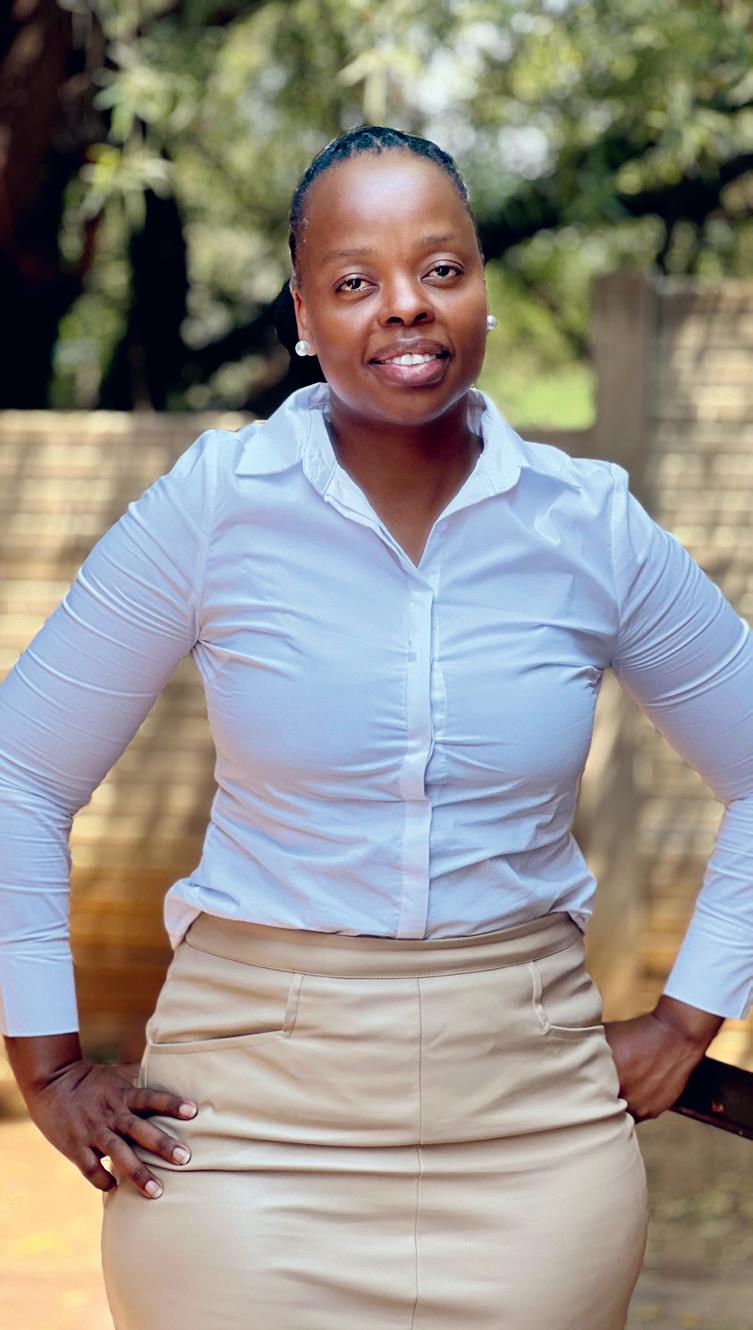
In response, she developed NPOConnect, a secure platform designed to help NPOs manage data, streamline compliance and provide funders with clearer visibility of their efforts. Supported by the MTN SA Foundation, Makena secured funding, revamped her digital presence and began building the platform alongside fellow entrepreneur Nondumiso Malaza.
NPOConnect is currently in pilot, with plans for a wider roll-out. The goal is ambitious: to create a digital backbone for the nonpro t sector that enhances ef ciency, transparency and access to support.
Makena’s journey illustrates how purpose-driven innovation, when properly supported, can transform entire ecosystems.
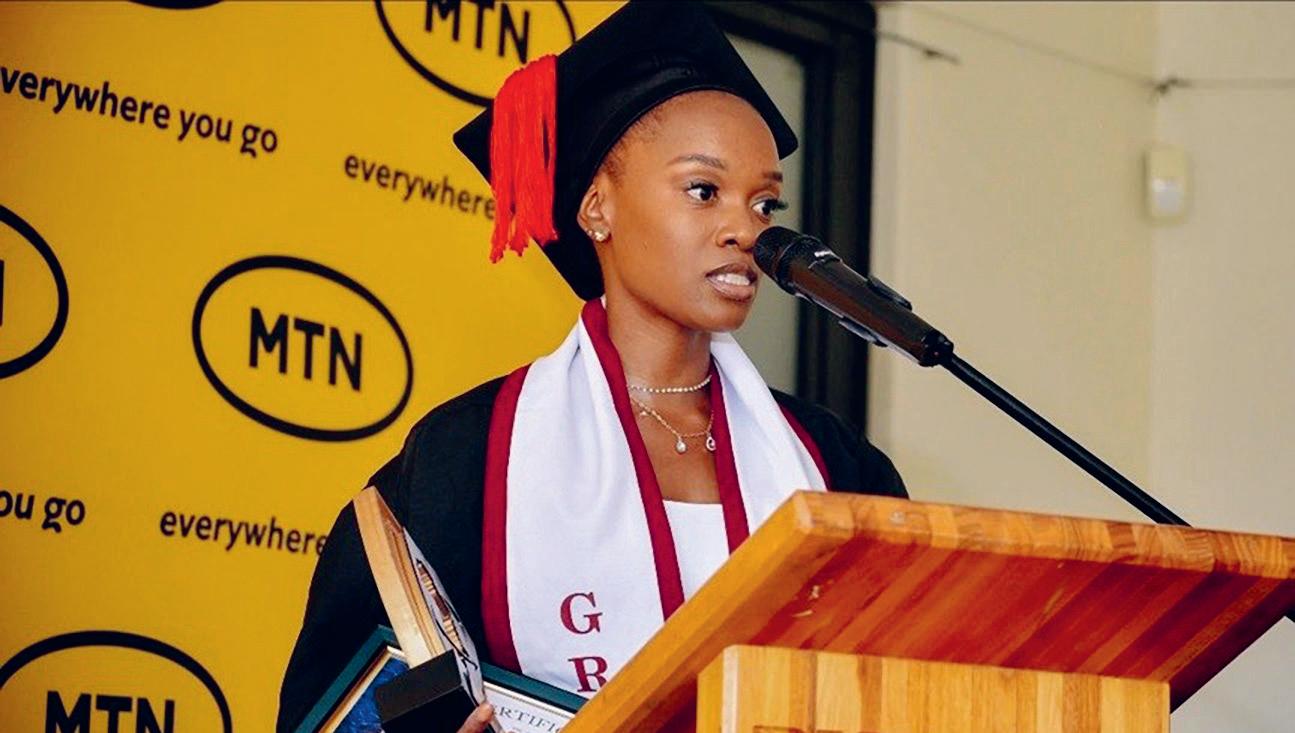
Joining MTN’s Digital Skills for Digital Jobs programme sparked Boipelo Malope’s desire to deepen her expertise in data analytics. She excelled, earning the programme’s Top Achiever Award and using her voucher to continue her studies at the University of Cape Town.
In 2024, her efforts took her further, as she was invited to represent the programme at the AIM Congress in the UAE, one of the world’s top innovation and entrepreneurship forums. Among more than 15 000 delegates, she shared her perspectives, highlighting the potential of women from small South African communities.
“Standing on a global stage reminded me that young people from underserved areas can shape the future if they are given the right tools and opportunities,” she shared.
Malope’s story underscores the lasting impact of targeted digital skills training, not just on individual lives, but also on young people’s perceptions of their potential.
Entrepreneur and data scientist Mamello Mofokeng launched her IT business, Saturated, in 2020 amid pandemic uncertainties. Recognising the need for small businesses to digitise to survive, she aimed to be part of this solution.
MTN IS ACTIVELY CLOSING THE DIGITAL
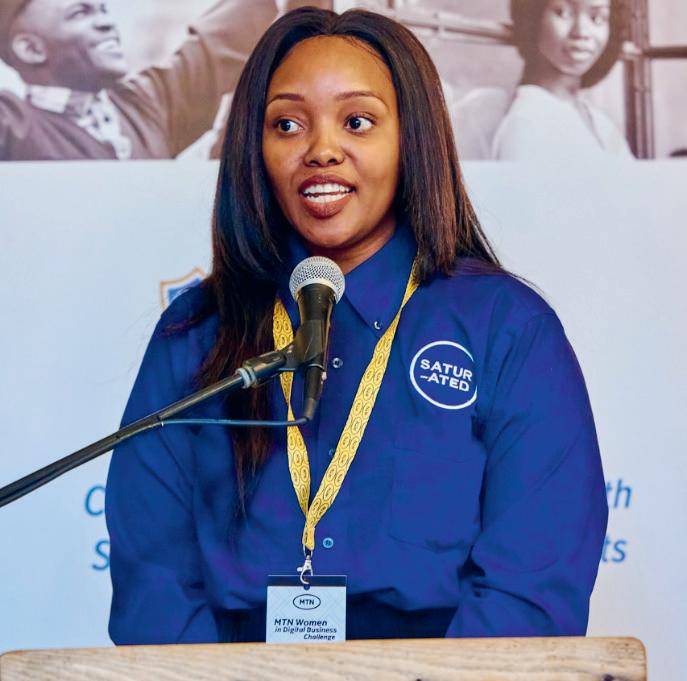
Winning a spot among the top 10 in the Women in Digital Business Challenge, she received funding and used it to invest in software, media and financial systems to grow her business.
Today, Saturated offers a range of tech-driven products:
• Etela Africa: a global travel and accommodation platform.
• Spana: a digital literacy and data use learning tool created during a hackathon.
• Asiye Sonke: a digital solution initially for burial societies, now used by funeral service providers.
BY SUPPORTING WOMEN IN DEVELOPING INNOVATIVE, SCALABLE SOLUTIONS WITH LASTING EFFECTS.
“AT MTN, WE SUPPORT WOMEN BECAUSE THEIR ACHIEVEMENTS CONTRIBUTE TO OUR NATION’S PROGRESS.”
– ARTHUR MUKHUVHA
“MTN’s support gave us more than funding, it provided structure, mentorship and confidence,” says Mofokeng. Her focus is now on high-quality service delivery, purposeful scaling and expanding into software engineering and digital strategy.
These stories from Makena, Malope and Mofokeng reflect a broader movement of women using technology to transform their lives, uplift communities and generate economic value. The stories also emphasise the importance of targeted support through funding, mentorship and training to help entrepreneurs advance.
“MTN’s commitment to women-led digital innovation underscores our broader pledge to inclusion, growth and social impact. By supporting women in business, we aim to shape a future where technology benefits everyone and women lead the way to what’s next,” Mukhuvha concludes.

Unlocking the potential of women across labour, entrepreneurship and leadership will translate into economic dividends for South Africa.
By THANDO PATO
Although women make up more than half of the country’s population, they remain under-represented in many parts of the economy, most notably formal employment, entrepreneurship and leadership roles in the corporate and public sectors. This means female empowerment is more than just a women’s issue; it’s a national socioeconomic emergency that is also identified in the National Development Plan (NDP) and the United Nations (UN) Sustainable Development Goals (SDGs) for 2030.
However, is the argument black and white? Are there nuances that require our closer attention to help us unlock more female participation in the economy?
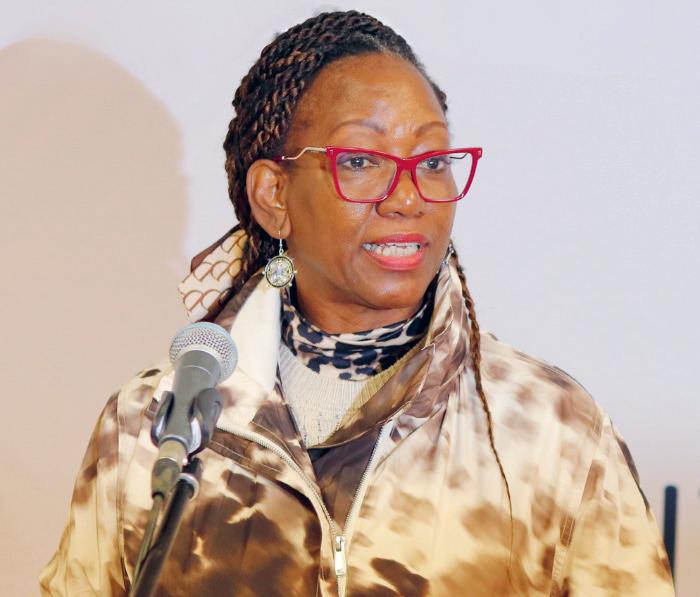
“Unlocking women’s potential in entrepreneurship and the formal economy is strategic as it will contribute to the country’s gross domestic product and address socioeconomic issues such as unemployment and poverty reduction. Case studies from programmes supporting women entrepreneurs show the positive impact these women have on their communities. If operated sustainably, their businesses create employment opportunities that help uplift struggling communities,” explains Agnes Phiri, programme manager of EntreprenHER at the UN Women South Africa Multi-Country Office.
Phiri says the EntreprenHer Programme, which UN Women implements with support from the De Beers Group, has visibly demonstrated that women-owned micro enterprises are making an impact.
“More needs to be done to scale these results across the country with more strategic partners and stakeholders because investment in women’s economic empowerment creates a direct path to gender equality, the eradication of poverty and economic growth that is inclusive.”
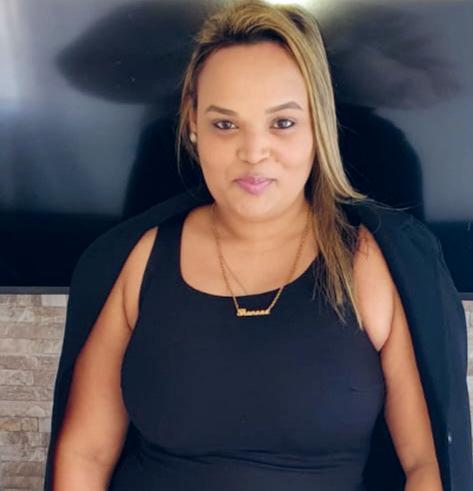
Dr Shanaaz Dunn, senior research specialist from the Developmental, Capable and Ethical State at the Human Sciences Research Council, elaborates further by explaining the impact women in the labour force have on social cohesion. “When women work, they boost household incomes, support their families and help grow the economy. Enabling women’s full economic participation is not just a matter of fairness; it is vital for South Africa’s economic future and social cohesion. It fosters growth, reduces poverty, uplifts families and helps close long-standing gender and social divides.”
According to Statistics South Africa (StatsSA), over 40 per cent of multigenerational households in South Africa are headed by women who financially provide for their families, making the participation of women
“UNLOCKING WOMEN’S POTENTIAL IN ENTREPRENEURSHIP AND THE FORMAL ECONOMY IS STRATEGIC AS IT WILL CONTRIBUTE TO THE COUNTRY’S GROSS
– AGNES PHIRI
“THE WAGE GAP IS AN ISSUE THAT AFFECTS ENTIRE FAMILIES AND COMMUNITIES. WHEN WOMEN ARE UNDERPAID, THEIR HOUSEHOLDS OFTEN STRUGGLE MORE.”
– DR SHANAAZ DUNN
in the economy critical for the survival and prosperity of families and communities. Yet unemployment remains one of the barriers for women entering the formal economy.
“Globally and nationally, we find the general consensus is that more women usually participate in the informal economy relative to the formal economy. The informal economy encompasses, but is not limited to, street vending, domestic labour, home-based childcare and informal retail, which typically offer little job security, often no benefits and generally low pay. However, the informal economy remains a vital source of income for millions, especially in South Africa, where unemployment is high,” says Dr Dunn.
Data from the Catalytic Strategy Gender Pay Gap Report, published in 2024, shows that in 2021 only 54.3 per cent of women of working age were participating in the formal labour force, compared to 64.9 per cent of men. While the burden of unemployment is more pronounced for women, across the board, it is even worse for black women, who carry the highest unemployment rate by race and gender, 39.8 per cent, says the report.
However, Phiri disputes how women’s participation in the economy is identified and measured, and argues that not enough attention and resources are directed towards the informal economy and unpaid care work.
“There are several misconceptions about women’s participation in the South African economy. A key misconception is that women do not contribute as much to the economy as men. The reality is that women are very active
in the economy both at formal and informal levels. In addition to operating in the formal economy, they also contribute greatly through the informal economy and unpaid care work.”
Phiri says globally, women spend 2.5 times as many hours a day on unpaid care and domestic work as men. “In sub-Saharan Africa, this number is at around 3.1 times more than men. Strengthened care policies, services, jobs and infrastructure are required to recognise, reduce and redistribute the unpaid care and domestic work burden, which is primarily shouldered by women.”
Dr Dunn explains that women, especially young and rural women, face higher unemployment rates and are more likely to be engaged in informal, low-paid work with no benefits or job security. “Women disproportionately carry the responsibility of childcare, eldercare and household tasks, which limits their availability for formal work or entrepreneurship and affects their work-life balance,” she adds.
In the formal economy, women face systemic challenges that include access to leadership roles and pay disparity. In South Africa, this is particularly disheartening because of supportive legislative frameworks such as the Employment Equity Act and the Promotion of Equality and Prevention of Unfair Discrimination Act and those around Black Economic Empowerment and Broad-Based Black Economic Empowerment. Women still face discrimination in promotion and hiring practices that often impact their career mobility, which, in turn, affects their earning capability. According to the Catalytic Strategy Gender Pay Gap Report, women only constitute 26.5 per cent of top management positions and 37.2 per cent of senior management in corporate South Africa.
Women’s representation, however, increases in lower-status and paying positions, where they constitute 48.2 per cent of professionally qualified positions and 49.4 per cent of those at the skilled technical level.
The report also states that approximately 59 per cent of part-time employees –who often do not receive employee benefits like medical aid and pension fund contributions – are women.
The gender disparity in senior positions means that women’s earning potential is affected further, in addition to the systemic salary gaps women face. According to StatsSA, women – across sectors, industries and positions – are likely to earn 30 per cent less than their male counterparts and, according to the Catalytic Strategy Gender Pay Gap Report, the gender pay gap range is as high as 35 per cent.
“The wage gap is an issue that affects entire families and communities. When women are underpaid, their households often struggle more, especially if they are single mothers or the sole income earner. It also means less money is contributed towards children’s education, food and healthcare, which can hurt the next generation. If women earned equally, they would spend more, save more and grow more businesses. Ultimately, the wage gap impacts all of us. Closing it would help fight poverty, boost the economy and create a fairer, more equal society,” explains Dr Dunn.
There have been many significant strides on all levels and in all sectors supporting women’s development, empowerment and elevation, particularly through legislative reform, institutional initiatives and advocacy efforts. However, more still needs to be done to close the gaps to ensure all women’s labour is recognised and compensated fairly.
Follow: Agnes Phiri www.linkedin.com/in/agnes-utunga-phiri Dr Shanaaz Dunn www.linkedin.com/in/shanaaz-dunn-132267133

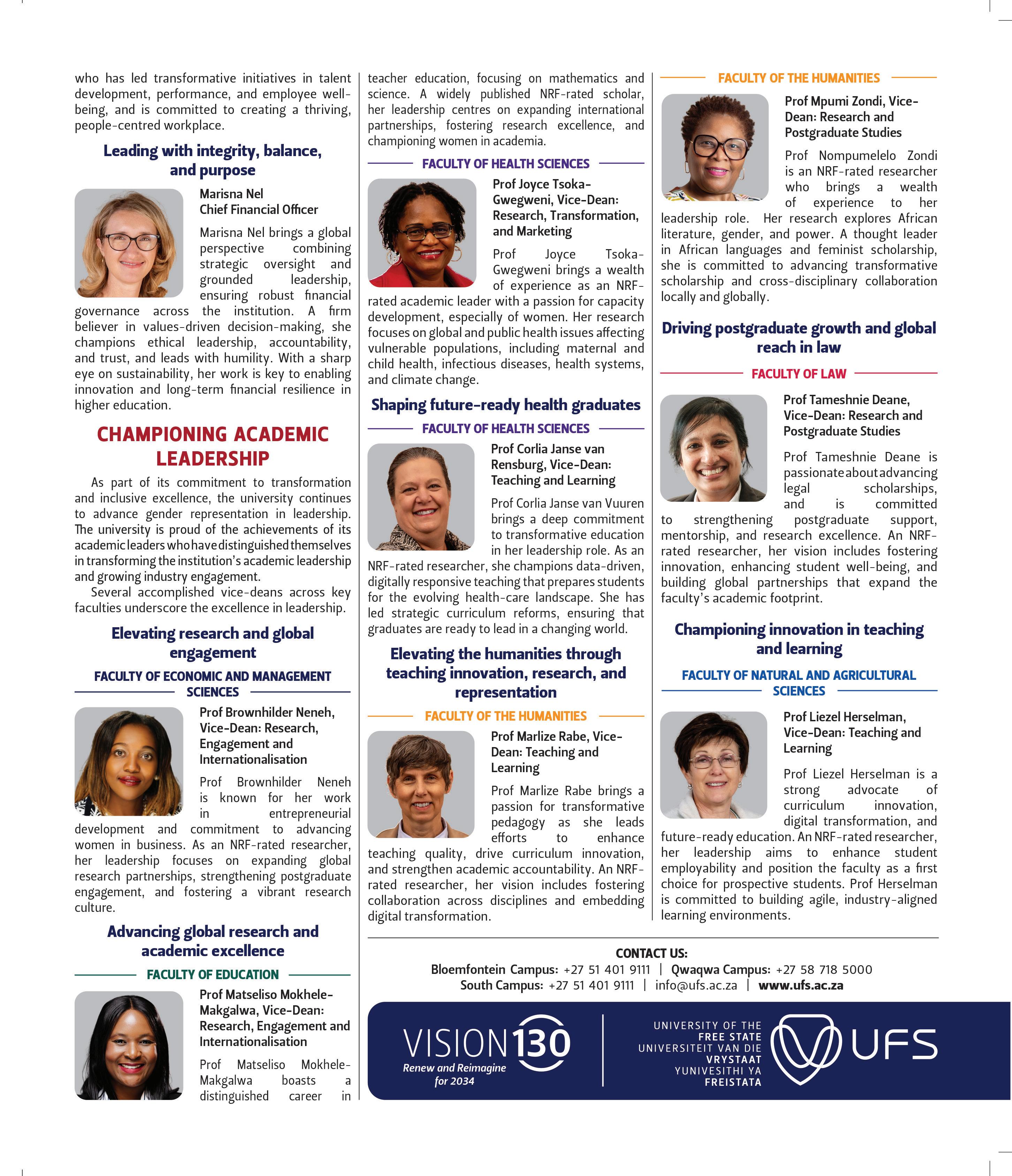
THANDO PATO
One of South Africa’s most pressing socioeconomic crises is gender-based violence (GBV), which affects women and girls disproportionately.
According to The First South African National Gender-Based Violence Study, 2022: A Baseline Survey on Victimisation and Perpetration released in 2024, 35.5 per cent of women aged 18 and older have experienced physical and/or sexual violence, regardless of their relationship status.
A significant driver of GBV among this group is intimate partner violence (IPV): 22.4 per cent of women report experiencing IPV, while 23.9 per cent have experienced physical or sexual abuse.
Although social and cultural factors are often emphasised as causes of GBV, the systemic economic forces that marginalise women –rendering them financially unstable and unable to leave abusive situations – are frequently overlooked. These economic vulnerabilities trap many women in ongoing cycles of abuse.
“Many women due to economic circumstances beyond their control are financially unstable because of structural inequality,” says Phinah Kodisang, CEO of the Soul City Institute.
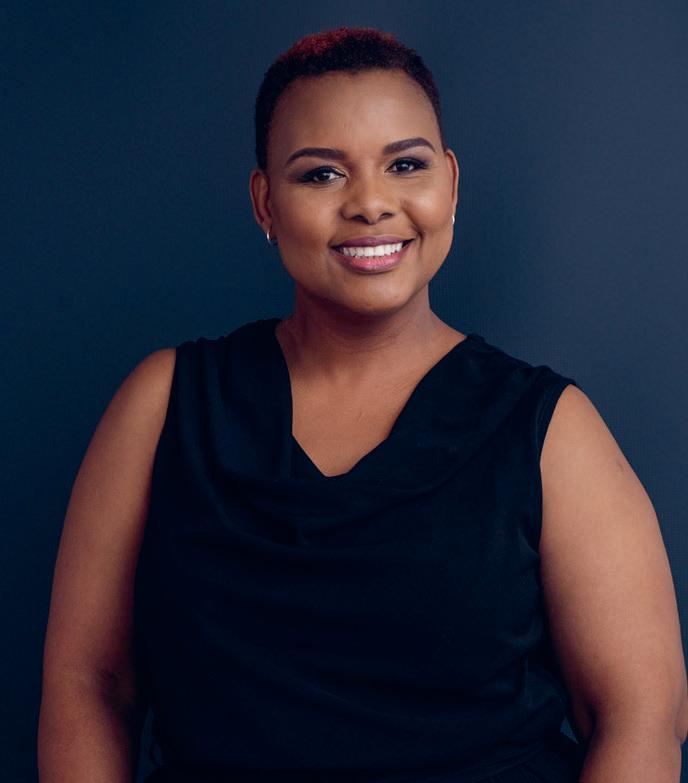
“They may be underpaid, unemployed or burdened with family responsibilities that drain their resources. In these situations, they often become financially dependent on their partners. If the relationship is abusive, they can become trapped. GBV is not always physical; it takes many forms.”
Kodisang explains that GBV includes economic and financial abuse. In intimate relationships, this might manifest as
“FOR MANY WOMEN, OVERARCHING SYSTEMIC ISSUES, SUCH AS THE GENDER WAGE GAP, UNEQUAL WORKPLACE CONDITIONS AND LIMITED ACCESS TO LAND OR CAPITAL, MAKE IT INCREDIBLY DIFFICULT TO BREAK FREE FROM ABUSIVE RELATIONSHIPS.”
– PHINAH KODISANG
manipulation, coercion, control, isolation or infidelity – all tactics that can leave a victim emotionally and financially vulnerable.
“For many women, overarching systemic issues, such as the gender wage gap, unequal workplace conditions and limited access to land or capital, make it incredibly difficult to break free from abusive relationships,” she says.
Development economist Phelisa Nkomo, board chair of Oxfam South Africa and a co-founder of the GBVF Response Fund, notes that women from middle- and upper-income backgrounds are not immune to financial abuse. However, it may appear more subtle and disguise itself as socially acceptable behaviour.
“In these cases, the abuse is more sophisticated. The man may position himself as the sole breadwinner and take full control of household finances. A partner might be unaware of how much her spouse earns or how he allocates his income,” she explains.
“There are also situations where a woman is discouraged from furthering her studies or upskilling, even when it would benefit the household, purely as a means of control and to diminish her independence.”
Nkomo describes instances where men control even the most personal aspects of their partner’s life, such as the clothing they wear or the toiletries they buy.
In what might be viewed as a more extreme case, but illustrates the coercive tactics that underlie abuse, is when a woman in a high-powered job “agrees” to hand over her monthly salary to her husband or partner who gives her a stipend, then decides how the rest will be used.
“All these behaviours create emotional and financial dependence that’s very hard to escape,” says Nkomo.
Nkomo identifies several systemic forces –cultural and social norms, the unpaid care economy and a patriarchal economic structure
– that contribute to women’s economic marginalisation and, by extension, their vulnerability to GBV.
“There’s a direct link between social norms that position women as second-class citizens and how women perceive their own financial sustainability in relation to masculinity and marriage. From a young age, boys are socialised to lead, protect and provide, while girls are raised to care for others and prioritise marriage and family. This message is inculcated across societies and determines how women are raised and how they perceive their adult life.”
This dynamic plays out, Nkomo says, in the undervalued care economy, where women shoulder the bulk of unpaid responsibilities – pregnancy, childrearing, household management and caring for the family and extended family, either physically or financially.
“These responsibilities limit women’s mobility in the formal economy and often prevent them from pursuing further education or career advancement. Women subsidise society through this labour, but it’s rarely measured or acknowledged in economic terms like gross domestic product,” says Nkomo.
She further notes that the structure of the economy itself is inherently patriarchal, favouring men and excluding women from wealth-building opportunities. The gender wage gap, limited career mobility and the financial penalties associated with pregnancy and caregiving responsibilities all combine to limit women’s ability to earn, own property, invest or save, affecting even women’s ability to retire well and creating what is often referred to as the gender retirement gap.
“When the economy contracts – as it has in South Africa for years – women are disproportionately affected. For many women in abusive relationships, concerns about financial security and the wellbeing of their children outweigh the decision to leave,” Nkomo adds.
According to The First South African National Gender-Based Violence Study, many women are sole breadwinners or reliant on social grants.
Unemployment is another crisis facing South Africa that impacts women more than men. Statistics South Africa’s Quarterly Labour Force Survey Q1 2025 shows that across all educational levels, women continue to experience higher unemployment and lower labour force participation than men. The expanded unemployment rate stood at 43.1 per cent, up 1.2 percentage points from

“THERE IS A MASSIVE BODY OF DATA THAT SHOWS THAT WHEN WOMEN CAN FEND FOR THEMSELVES AND THEIR CHILDREN, THEY LEAVE ABUSIVE RELATIONSHIPS.”
– PHELISA NKOMO
Q4 2024; women’s unemployment rate was 35.5 per cent, compared to 30.7 per cent for men.
“Over the 10 -year period from Q1 2015 to Q1 2025, gender disparity in unemployment has remained persistent, regardless of educational attainment. Women with or without tertiary qualifications consistently face higher unemployment than men,” states the report.
The biggest rise in unemployment has been among women with tertiary education, whose jobless rate continues to climb – although the Q1 2025 report does not provide specific figures by qualification, the upward trend remains clear. Women with only a matric qualification have also seen a steep increase in unemployment over the past decade, reinforcing the persistent gender gap in the labour market.
So economic growth and job and wealth creation are imperative for tackling GBV. Nkomo says data shows that women who experience financial security break the cycle of GBV.
“There is a massive body of data that shows that when women can fend for themselves and
their children, they leave abusive relationships. So, the focus needs to be on recognising the role of women in society and how all their work contributes to the economy.
“There needs to be a national commitment towards recognising women’s role in society and prioritising their needs economically. We should be subsidising childcare, housing and healthcare. I find it ironic that women must pay for sanitary pads, but condoms, male contraception, are free.
“In certain European markets, single-parent households are subsidised. We need to look at levers that support women throughout the economic value chain. And, it’s not just about supporting and empowering women, but supporting and empowering their children, the next generation.”
Kodisang echoes Nkomo’s sentiment stressing the importance of tackling systemic economic inequality and creating an environment where all women, including survivors of GBV, can thrive.
“The national budget needs to be gender-responsive so it can close the gaps that leave women vulnerable. There must be formal investment in the care economy, where many women already operate. The government has already made commitments to support women-led businesses, but we need transparent reporting on how far that exercise is.
“Our goal as a country should be to ensure that women are economically empowered and financially secure so they can sustain themselves,” she concludes.
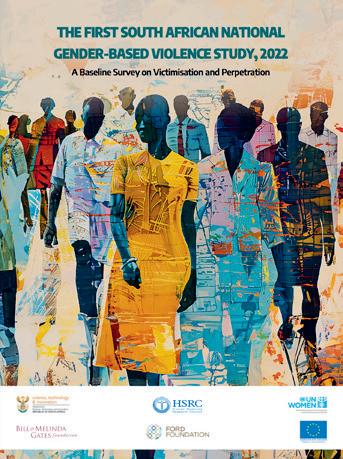

THE FIRST SOUTH AFRICAN NATIONAL GENDER-BASED VIOLENCE STUDY, 2022: A BASELINE SURVEY ON VICTIMISATION AND PERPETRATION
Follow: Phinah Kodisang www.linkedin.com/in/phinah-kodisang-710a6354
Phelisa Nkomo www.linkedin.com/in/phelisa-nkomo-5535941ab
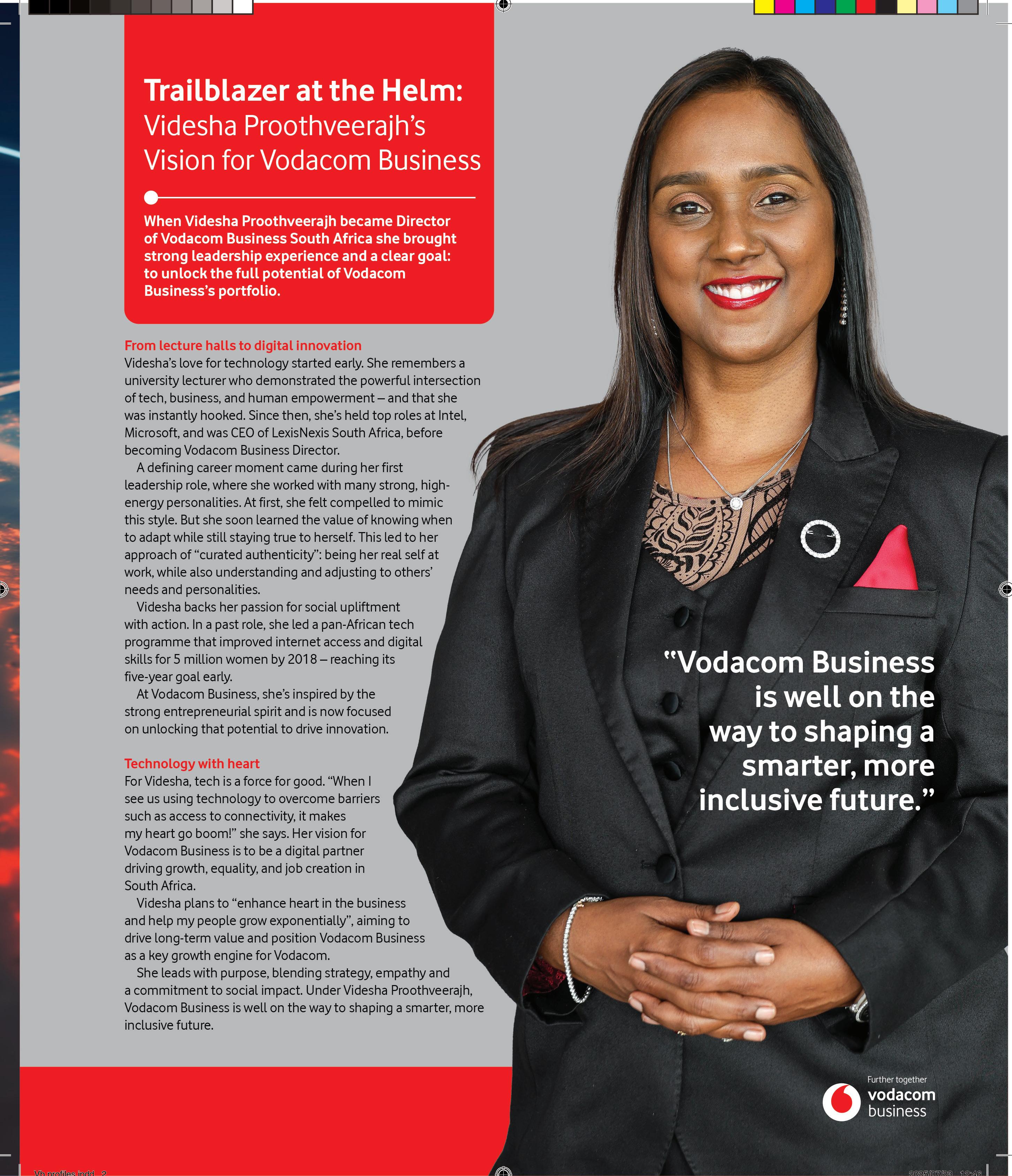
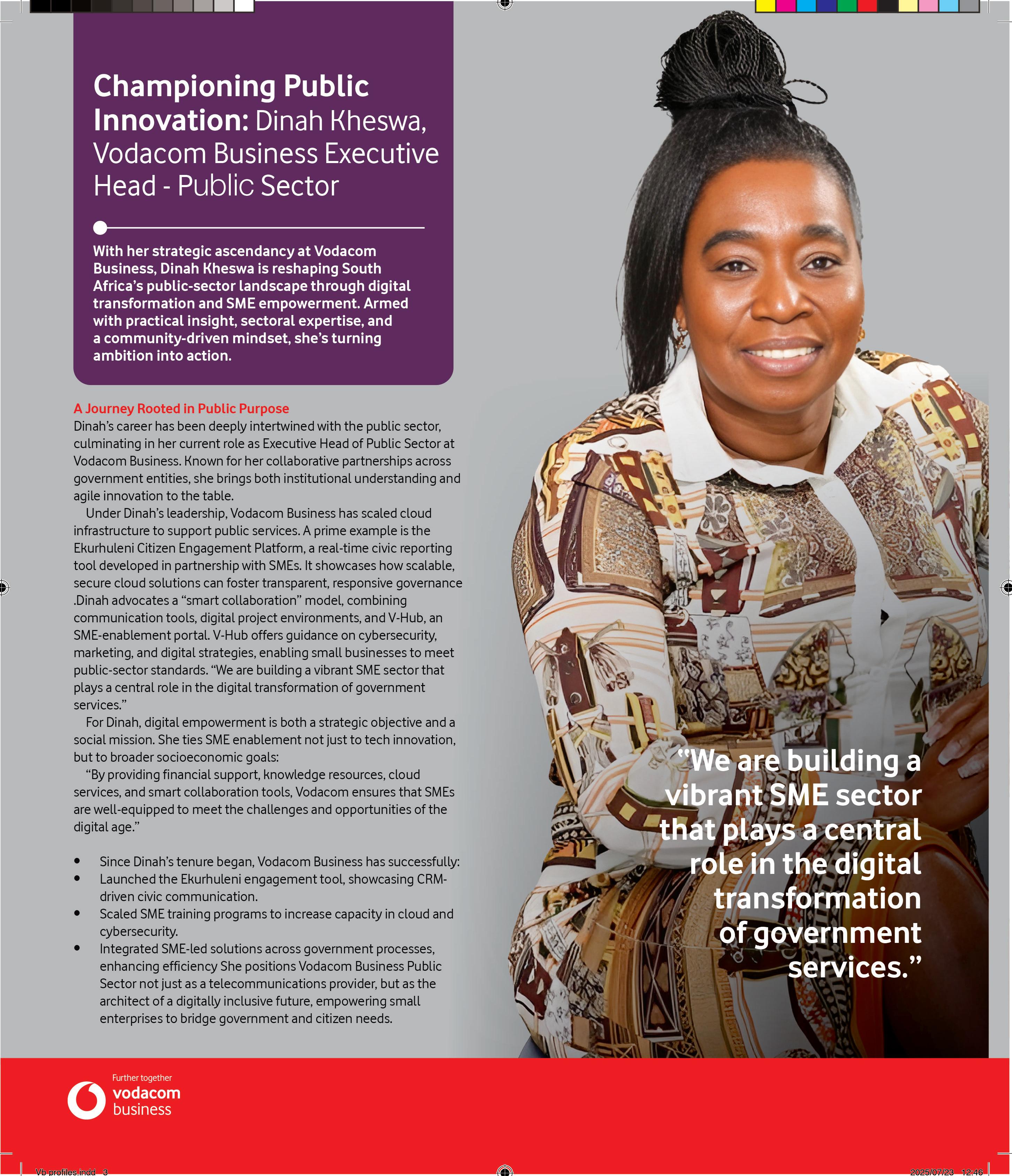
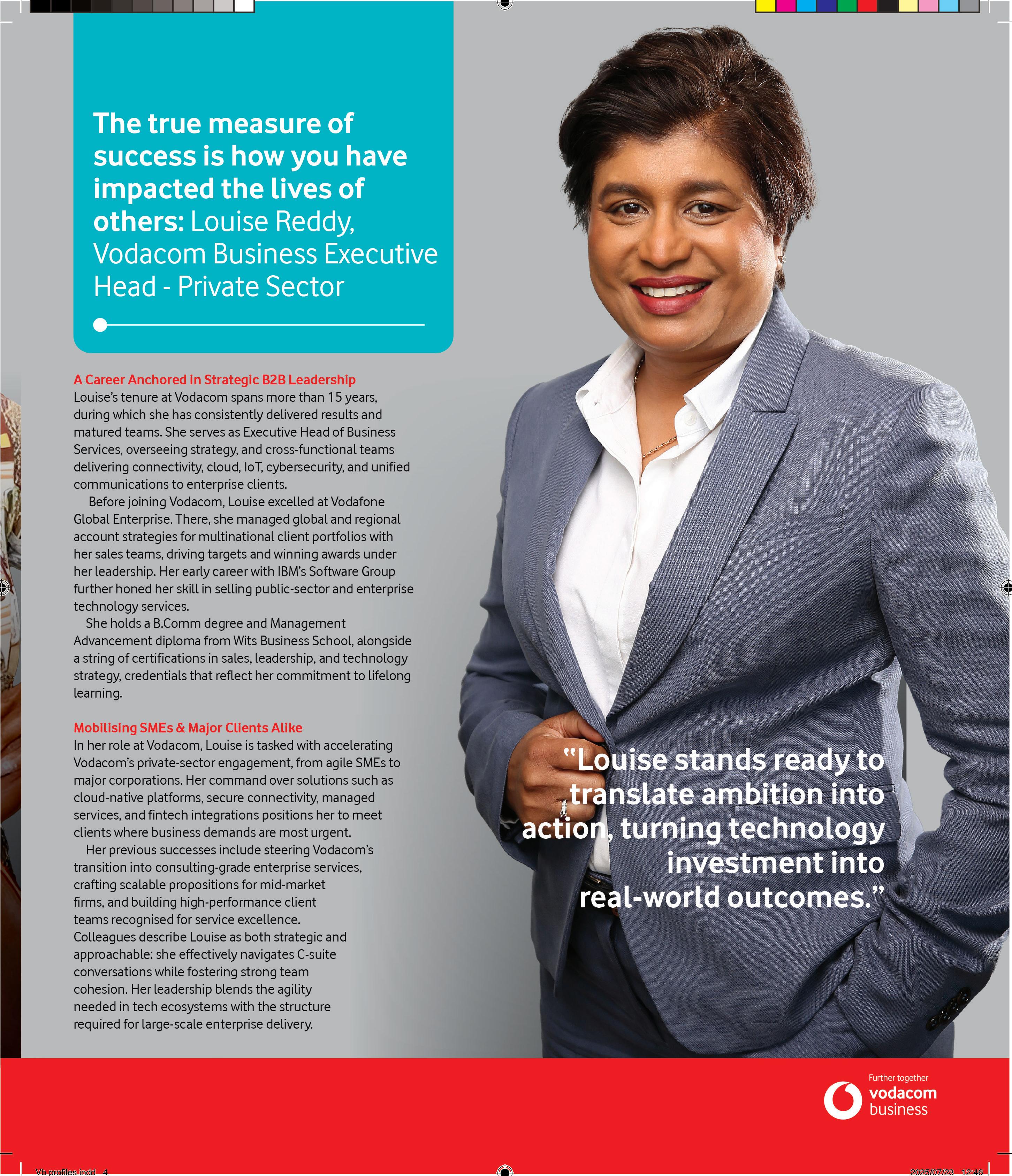
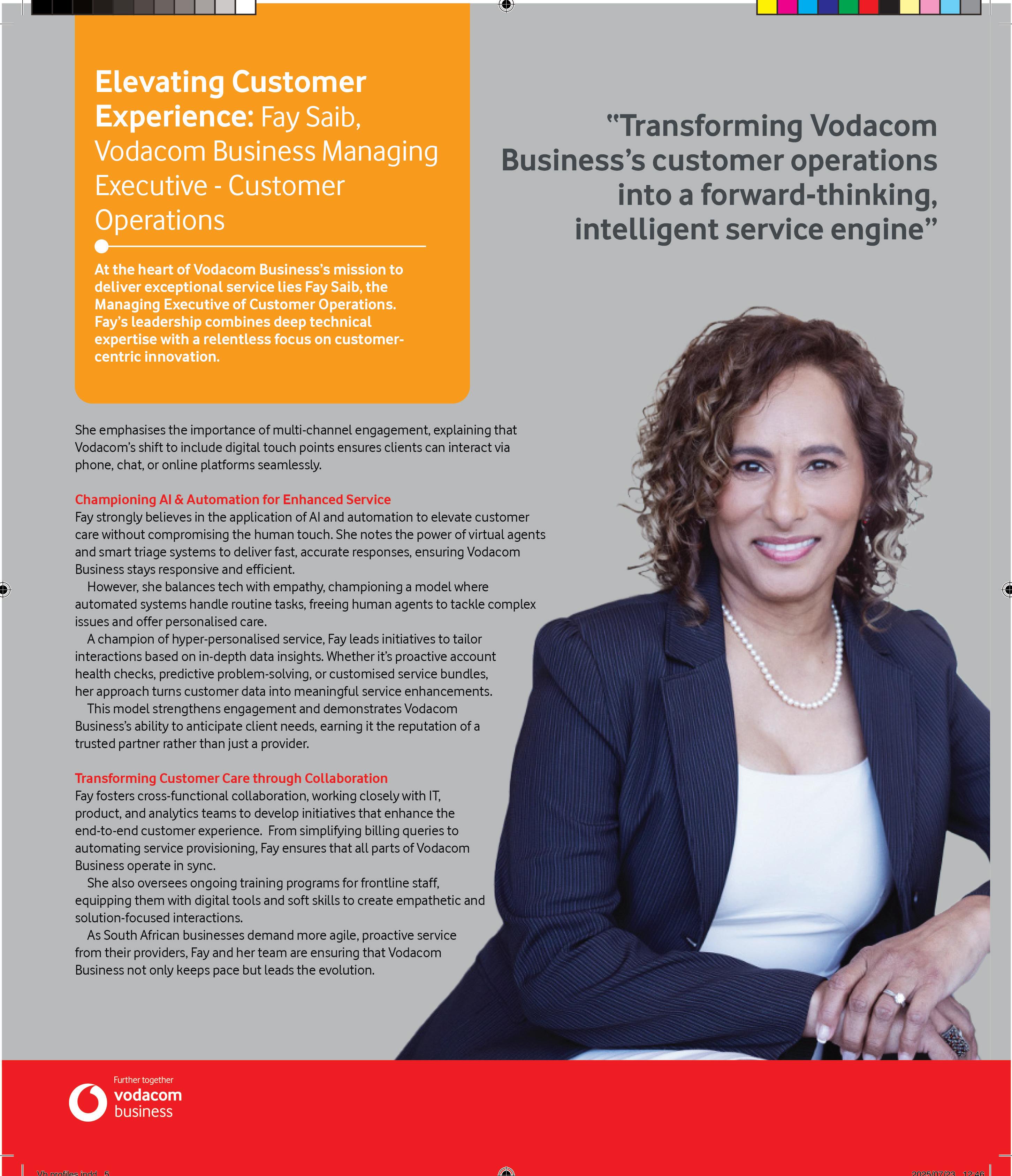

Martha Lamola, Operations DirectorVodacom Ventures
What defines a future change-maker in today’s digital world? MARCHELLE ABRAHAMS meets two dynamic Gen-Z women who are breaking barriers, building impact-driven ventures and shaping a bold new future for South Africa – all before the age of 30
Gen-Z – those born between 1997 and 2012 – is coming of age in a time of extraordinary possibility where they are not bound by traditional pathways to success. For a growing number of young South African women, the journey to leadership is no longer about following a linear route – it’s about forging bold, inclusive, purpose-driven paths that leave the door open for others.
Two emerging leaders, Mas’ooda Varachia and Morongwa Ramasobane, are proof that Gen-Z isn’t waiting for permission to lead. They’re rewriting the future, now.
When Varachia appeared on the Forbes Africa 30 Under 30 Class of 2025 list, she took the recognition in stride. “Yes, I’m proud,” she says, “but when you come from a family of colour, unfortunately, the traditional de nition of success is often marriage and children. Happily, that’s not my measure.”
Varachia is the founder and CEO of USS Raven, a tech company creating smart solutions using internet of things technology for the agriculture and mining sectors. It’s an unconventional route, considering she holds a degree in psychology, but then again, nothing about her journey follows convention.
“People are often confused about how I went from psychology to the fourth industrial


THEIR ACTIVISM MAY NOT ALWAYS BE LOUD, BUT ITS IMPACT IS UNDENIABLE.
revolution,” she says, “but I’ve always been passionate about creating solutions that make life better for others.”

“It’s not about charity, it’s about economic empowerment. One small step for me is not just for me; it’s for everyone else behind me.”
While Varachia builds in tech, Ramasobane is shaping the future through strategy, mentorship and grassroots advocacy. A senior consultant at a global professional services rm, she’s quick to point out that impact doesn’t always shout.
“Some of the most meaningful change is quiet – it’s in the mentoring, the listening, the lifting up of others.”
Originally from Alexandra township in Johannesburg, Ramasobane and her siblings moved to Diepsloot at a young age, an experience that ignited her commitment to community upliftment. She attended LEAP 4 School, where educators recognised her potential and supported her leadership journey. By the time she reached high school, she was already secretary of Nelson Mandela’s Children’s Parliament and later became chairperson of Afrika Tikkun’s junior board.
“Afrika Tikkun changed everything for me,” she says. “It taught me to stop using my background as an excuse and start using it as motivation.”
Her agship project – a beekeeping initiative for rural black farmers – exempli es that commitment. In partnership with the Mineworkers Development Agency, USS Raven provides training and eco-friendly beehives (made from recycled polystyrene) to local farmers. These farmers are not just producing honey; they’re building ownership, creating jobs and generating sustainable income.

“In every initiative we do, job creation is at the core,” Varachia explains.
Outside of her corporate role, Ramasobane is deeply involved in youth empowerment. Her latest project – a social enterprise that runs sanitary pad drives – tackles period poverty head-on. She and her team identify under-resourced schools and provide essential menstrual products so girls never have to miss school due to something so basic. “We believe no girl should fall behind simply because of her biology,” she says. “It’s about dignity, equality and access.”
Like Varachia, Ramasobane sees her leadership as part of a broader ecosystem of change led by young women. “Our generation – and the ones that come after us – are bold, creative and passionate,” she says. “We are not waiting for the world to change. We’re changing it ourselves.”
Gen-Z women like Varachia and Ramasobane are not just making waves, they are building bridges, breaking ceilings and carrying others with them. Their activism may not always be loud, but its impact is undeniable.
Follow: Mas’ooda Varachia www.linkedin.com/in/mas-ooda-varachia-58b474235 @Masoo_v Masoo_v Morongwa Ramasobane www.linkedin.com/in/morongwa-ramasobane-5a065613a
DR PHINDI CEBEKHULU-MSOMI , founder and CEO of Hazile Group, shares how her journey from hardship to innovation reveals how women-led farming and local resilience can transform South Africa’s food systems and climate future
Iwas born in Soweto during the 1970s – a time of political unrest, spatial injustice and systemic exclusion under apartheid. From an early age, I became aware of how deeply interconnected our survival is with access to essentials: water, food and energy. In many communities like mine, these resources were not just scarce; they were systematically controlled, often leaving women to carry the burden of making something out of nothing.
My journey into entrepreneurship was born from a place of hardship and resilience – a young mother who lost her mother and husband early in life and later experienced the instability of losing her home while pregnant with twins. During these defining moments, I found clarity: real change begins when we dare to reimagine systems – starting with the soil beneath our feet.

As the founder of Hazile Group, an agribusiness focused on sustainable food systems, I lead with the understanding that agriculture is not just about growing crops; it’s about cultivating resilience. Our approach integrates climate-smart farming, renewable energy and water stewardship to transform how communities grow, distribute and consume food. We grow hydroponically, a method that conserves water and eliminates the need for chemical inputs. This is not only about food security; it is a model for climate adaptation in South Africa.
Our innovations include the development of Eco-Farm Pods, modular food-growing units made from recycled plastic bottles and powered by solar energy. These pods are designed for informal settlements and rural communities, offering women and youth a dignified, circular way to produce food, conserve water and generate income.
However, our work goes beyond technology. At the heart of it is a commitment to women’s empowerment. As part of our corporate social responsibility, we train women in regenerative agriculture, co-operative governance and green entrepreneurship. We understand that true sustainability is not just environmental; it is social. When women lead in farming, households eat better, children go to school and communities begin to heal.
As the winner for the 2025 Veuve Clicquot Bold Future Award, I’ve had the privilege of joining a global sisterhood of trailblazers who are changing the world with courage and conviction. This recognition affirms that our grassroots solutions hold global relevance – and that African women are not just recipients of aid or policy; we are designers of the future. Bold leadership is not about having all the answers – it is about asking new questions and being brave enough to act on the answers we discover together.
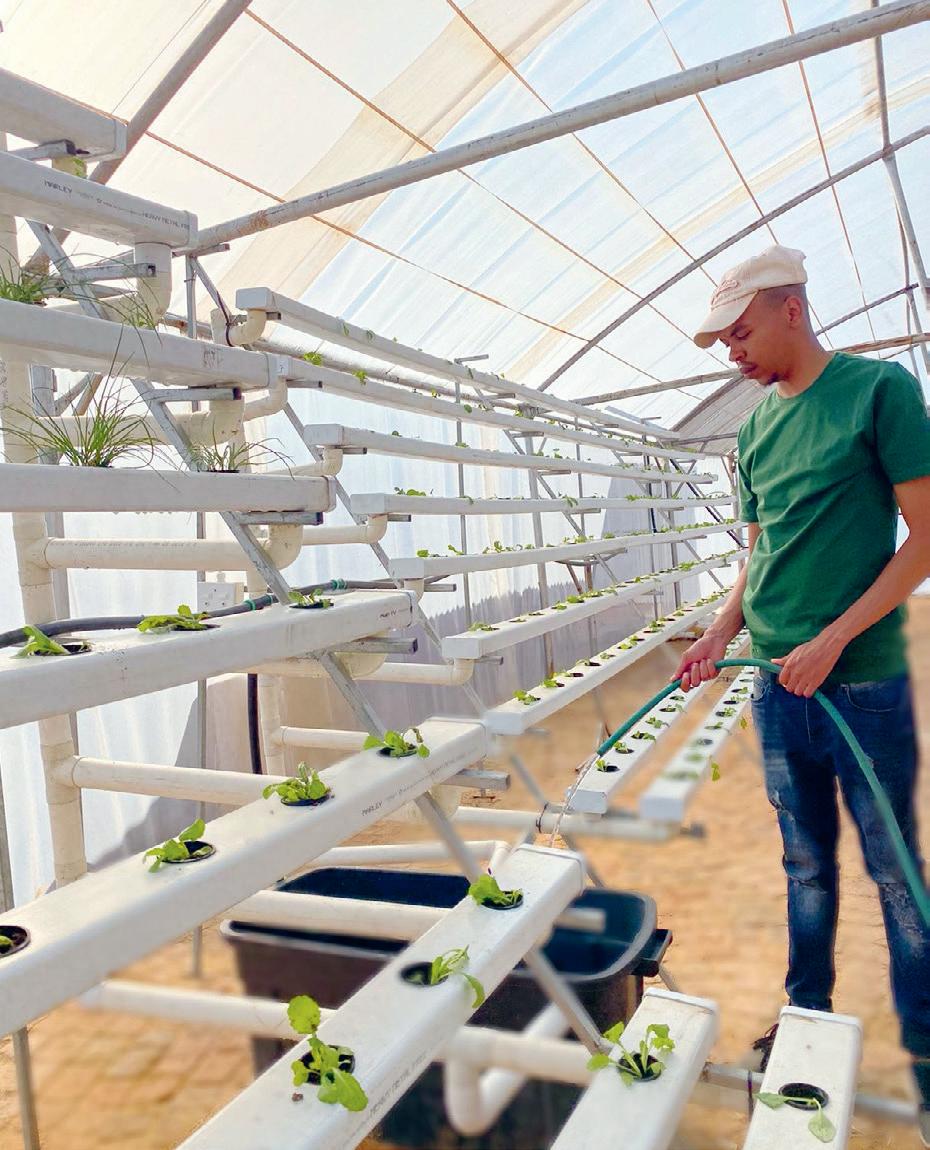
South Africa is rich in biodiversity, sunlight and youth potential, yet disproportionately affected by floods, droughts and food insecurity. The climate crisis is not a distant threat; it is daily reality. However, I believe we can turn crisis into a catalyst by investing in local innovation, dignified livelihoods and inclusive governance.
Looking forward, my vision is clear: a food system that doesn’t extract, but regenerates. One where women of all walks of life – from rural villages to townships and cities to coastal towns – lead climate-smart farms that are also data hubs, solar stations and water sanctuaries. A future where young women with coding skills, seasoned growers with ancestral wisdom and community leaders grounded in lived experience work side by side. A system that values indigenous knowledge and artificial intelligence, tradition and technology, proving that sustainable futures are most powerful when they are inclusive, intergenerational and locally led.
On this National Women’s Day, let’s redefine what it means to farm, to lead and to build resilience – not just for some, but for all. Climate action is not gender-neutral. When we empower women to be part of the solution, we don’t just tackle climate change; we grow a bold, just and sustainable tomorrow.
Follow : Dr Phindi Cebekhulu-Msomi www.linkedin.com/in/drphindi-msomi-hazile
How women-led leadership is reshaping the future of development in South Africa –a personal reflection from Kagiso Trust CEO DR MANKODI
Kagiso Trust was launched in 1985 to provide direct assistance to people suffering under apartheid. As a conduit for development funds from Europe, it supported marginalised communities and addressed specific needs in areas such as education, healthcare and community-based institution building.
The trust has become one of South Africa’s leading development agencies, focusing on education, socioeconomic development, civil society and local government. As it celebrates its 40th anniversary, its work is as important as ever. The scale of poverty, unemployment and inequality demands impactful interventions.
Over 40 years, Kagiso Trust has gained vast experience about the best way to go about development work, and it has learned three key lessons:
• Partnerships are vital. Civil society, government and the private sector can achieve far more together than they can alone.
• Top-down initiatives don’t work. The bottom-up approach ensures solutions are relevant and owned by the communities they target.
• Igniting human capacity promotes sustainability. When individuals are empowered, a more inclusive and prosperous society is the inevitable result.
How do development agencies and nonprofits apply these lessons in their work? It starts with finding leaders who have the skills to set and

sustain organisational culture. While it’s important to acknowledge that leadership styles are highly individual and not determined by gender alone, those leaders are often likely to be women.
In general, female leaders lean towards more collaborative, participatory and direct communication. They tend to emphasise listening, seek input from their team and provide more detailed explanations for decisions. This fosters inclusion and also sets the tone for how the organisation should operate.
Women are often associated with transformational leadership, which focuses on inspiring and empowering team members –fostering individual growth – and building strong relationships. They tend to motivate by helping team members find self-worth and satisfaction in their work. They often approach conflict in a collaborative and consensus-building way, seeking solutions that benefit all parties. And, they are often perceived as having higher levels of emotional intelligence and empathy, which can lead to a more supportive work environment.
When you think about it, these broad traits of female leadership are the same characteristics successful development agencies need in their work, which often involves complex social challenges, community engagement and a strong emphasis on human wellbeing.
The “softer” skills – empathy, collaboration, inclusivity and a focus on relationships and long-term empowerment – are precisely the qualities that are highly effective and desirable in the complex and human-centric field of development.
As the CEO of Kagiso Trust, I lead an organisation that’s mostly female and am supported by a female chairperson, Mankone Ntsaba. Together – and with the vital support of our male colleagues – we make a powerful team, and the results show where it matters:
• In impactful educational programmes that are tangibly changing the trajectory of thousands of lives.
• In pioneering local government initiatives that are harnessing the power of partnerships.
• In civil society programmes that are building human capital in communities throughout the country.
• In carefully targeted funding and training for entrepreneurs in agriculture and property.
I’m inspired by the women I work with. People like Kagiso Trust’s head of communications and marketing, who in the run-up to last year’s elections led a successful voter education campaign, and our head of education, whose work to transform perceptions of technical and vocational education is opening new career horizons for young people all over the country. They and the many other women who have made Kagiso Trust a resilient, sustainable organisation build networks and partnerships rather than empires. They focus on collective problem-solving and shared power structures. They break cycles of dependency through empowerment-focused approaches that ignite human capacity. They create pathways for systemic change rather than just alleviating symptoms. And, they build social inclusion through their inclusive approach.
To the numerous women making a difference in development work: we see you!
Follow: Dr Mankodi Moitse www.linkedin.com/in/dr-mankodi-moitse-927a2a84

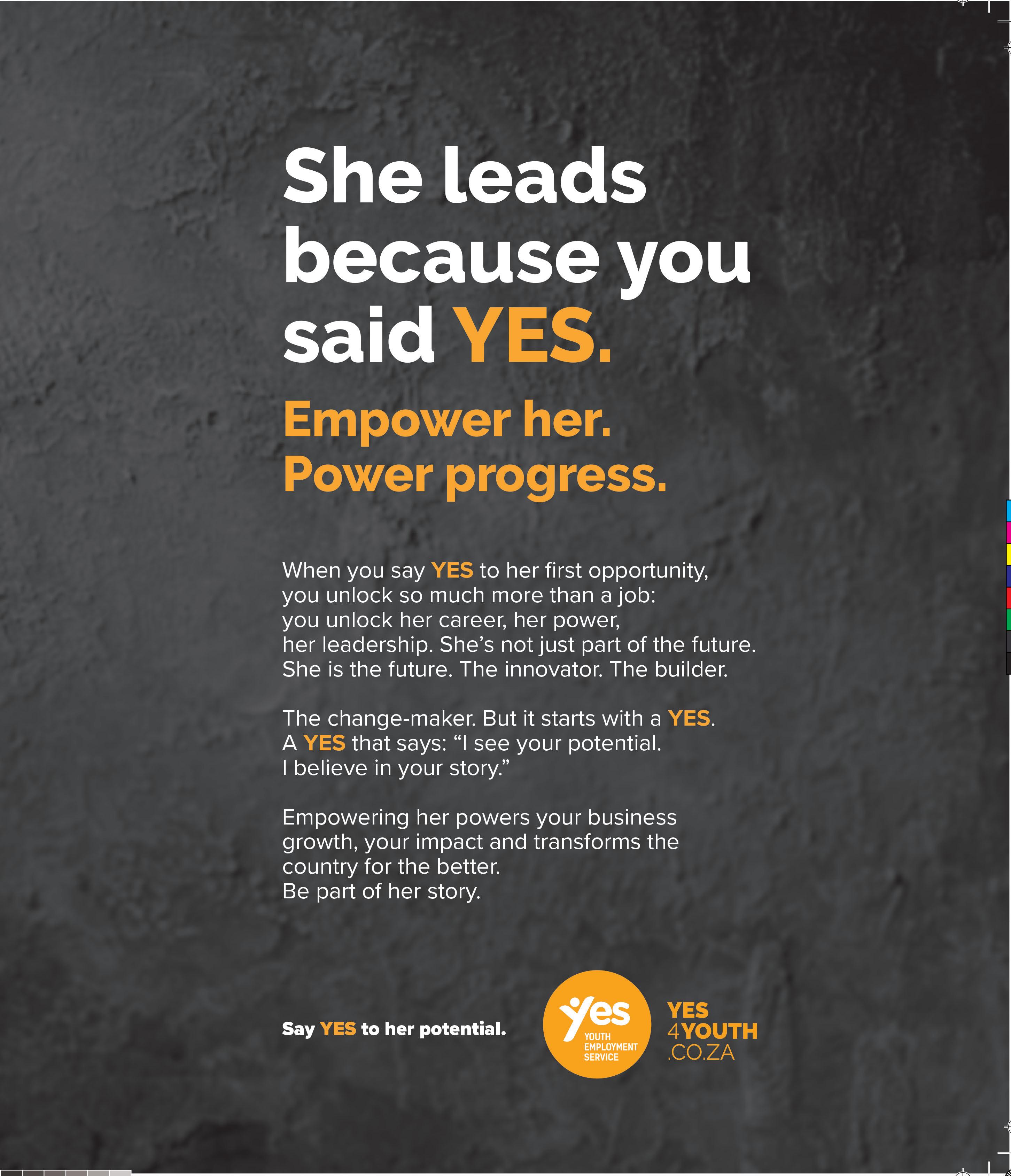
Even as digital careers boom, many girls in South Africa and across Africa remain sidelined in tech. RAINA JULIES speaks to the CEO and founder of GirlCode, Zandile Mkwanazi, about access to formal training being just one hurdle the girl-child must overcome
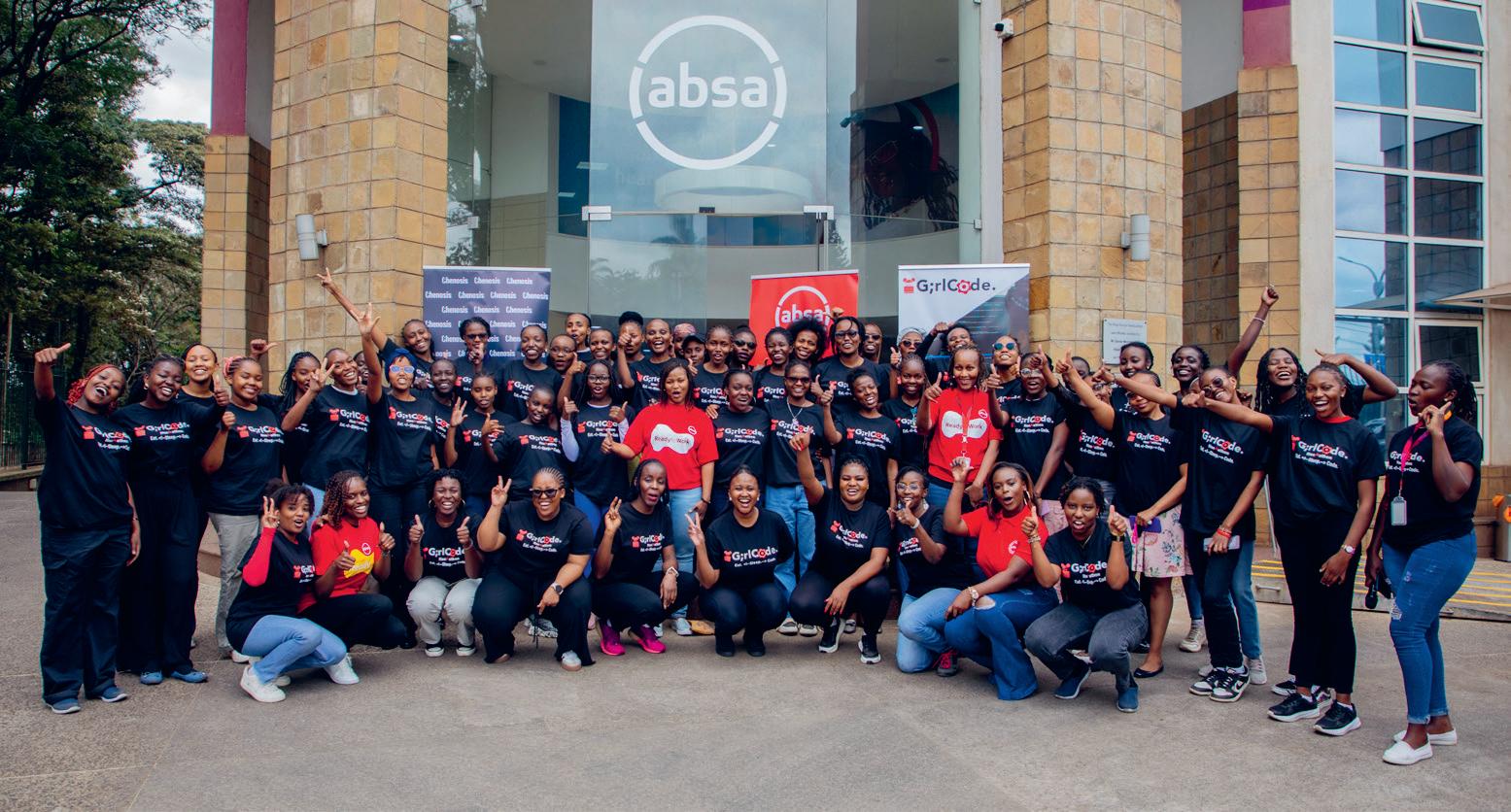
Studying computer science doesn’t automatically prepare you for the workplace, says Zandile Mkwanazi, CEO and founder of GirlCode. “In traditional African groups and homes, especially, you get home and you’re expected to cook, clean and take care of siblings, so there’s no time to build side projects, enter coding competitions or just experiment like your male peers do.”
While some may get accepted into formal training or university programmes, they’re often still excluded from the kind of informal learning and experimentation that builds confidence and career readiness.
GirlCode, a South African social enterprise, is tackling that problem head-on, building pathways for girls in South Africa and Africa to enter the tech sector by offering access to skills development opportunities and a supportive network of like-minded women. Since its launch, the organisation has reached over 90 000 women and girls through digital skills
“WE’RE BUILDING A TECH SISTERHOOD WHERE GIRLS ACROSS AFRICA CAN SUPPORT EACH OTHER, LEARN FROM EACH OTHER AND BUILD TOGETHER.”
– ZANDILE MKWANAZI
programmes, boot camps, mentorship and job-readiness initiatives.
Now active in six African countries, GirlCode is building a pan-African tech community where young women coders, entrepreneurs and innovators can learn, collaborate and grow together.
“We’re building a tech sisterhood where girls across Africa can support each other, learn from each other and build together,” says Mkwanazi. “That kind of community is powerful and shows
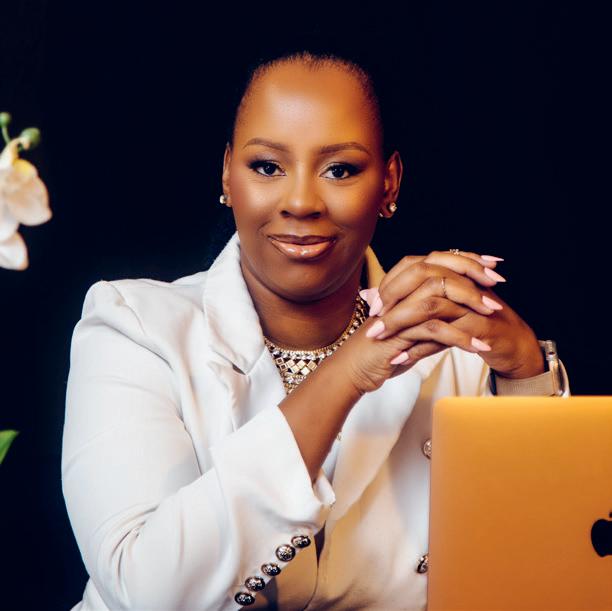
girls they’re not alone. It gives them the confidence to take up space in an industry that wasn’t really built with them in mind.”
One of the key vehicles driving GirlCode’s impact is its annual #GirlCodeHack, a 30-hour hackathon where participants work in teams to solve real-world challenges using tech. With mentorship from engineers, developers and start-up founders, the experience is designed to push participants beyond theory and into practical collaboration.
This year’s hackathon will run from 11 October, with simultaneous events in South Africa, Kenya, Botswana, Uganda, Tanzania and Ghana. In addition to a R100 000 prize, top participants gain exposure to recruiters, employers and future collaborators, many of whom have hired directly from the programme.
“For many of these girls, it’s the first time they’ve been in a space where they’re surrounded by people like them,” says Mkwanazi. “They get to see what’s possible.”
This will be the second year the hackathon runs outside South Africa, something Mkwanazi says wouldn’t be possible without deep, long-term partnerships. She credits GirlCode’s relationship with Absa Group as a key turning point.
“When we approached Absa, they didn’t just fund the event. They said, ‘How can we support you in our other African markets?’ They connected us to their in-country teams, opened their venues to us and brought their networks into the room. That’s the kind of partnership that moves initiatives like these from intention to impact.
“We’re preparing girls to lead, to become CTOs, start-up founders and the next generation of tech innovators in Africa. However, for these efforts to truly make an impact, we need the whole ecosystem to back them and us, too,” concludes Mkwanazi.
NOBESUTHU NDLOVU, director of SME at Old Mutual Corporate, shares insights on the critical link between mental wellness and economic growth for women entrepreneurs
As the lead advocate behind South Africa’s rst large-scale study into entrepreneur mental health, I believe mental wellbeing isn’t a side issue, but the bedrock of economic progress. When women entrepreneurs thrive in mind and spirit, the uplift ripples outward: families ourish, communities stabilise, businesses strengthen and the nation’s economy gains vital momentum.
Across provinces – rural, semi-urban and urban – similar patterns emerge among women juggling the dual demands of family and business. Women with supportive peer networks, coping tools and af rming business environments report higher subjective wellbeing and business performance, despite feeling emotionally bankrupt and isolated. However, the economic cost of ignoring these realities is enormous. According to health economists, South Africa already bears an estimated R161-billion in annual losses due to unaddressed mental health conditions, such as depression and anxiety, resulting in lost productivity, presenteeism, absenteeism and even premature mortality.
A recent GEM Special Report on Women Entrepreneurship in South Africa summarised several barriers to women’s entrepreneurial growth, including access to funding, networking opportunities, work-life balance, perception of risk and con dence, market barriers, gender bias, resource limitations and regulatory obstacles. Furthermore, research shows that women business owners experience elevated levels of stress, anxiety, depression, imposter
and funding readiness, with digital transformation in mind. Enhanced digital exposure promotes nancial inclusion and supports sustainable growth, reaf rming the vital link between wellness and success in women-led businesses. Fatigue, if unaddressed, erodes decision-making, sti es innovation and weakens resilience, ultimately diminishing entrepreneurial ambition.
syndrome and loneliness – exacerbated by wage gaps, caregiving burdens and limited support structures. In a nutshell, it’s hard to be a woman entrepreneur in our country. In the absence of supportive institutional arrangements at home or in the marketplace, women may also struggle with work-life balance, which can limit their time and energy to focus on business growth. Despite this, women entrepreneurs are engines of social and economic change. In South Africa, women-led enterprises generate jobs and reinvest up to 90 per cent of their earnings into families and communities.
The focus on mental wellness is not a side issue; it’s foundational to economic progress, as af rmed by the South African MSME Access to Finance Report 2025, which highlights targeted solutions to uplift women-led small businesses through inclusive nance and structural support. It urges credit scoring model reform – using ntech, alternative data and open nance frameworks – coupled with credit guarantees tailored to micro enterprises, which are often led by women. The report underscores that nancial readiness support – including access to and adoption of accounting and payroll platforms – is critical for micro enterprises. I advocate for the inclusion of mental wellness in this list – placing it at the core of economic empowerment is long overdue.



Women entrepreneurs need nancial products designed to boost their con dence






As South Africa marks Women’s Month, the call to action must shift toward advocating for mental wellbeing as a foundational pillar of empowerment. Integrating mental wellness into funding readiness, mentorship programmes and business development pathways will empower women to lead with purpose, not just pressure. This intentional transformation enables women to emerge as con dent stewards of change. When nurtured within supportive ecosystems, their businesses become nancially stable engines of employment, strengthening families and communities alike.
With the release of South Africa’s rst comprehensive entrepreneur mental health report, we stand at a pivotal juncture. We have the opportunity to elevate mental wellness from a footnote to a central framework. We can design ecosystems where women are not merely surviving entrepreneurship, but thriving –impacting communities and serving as models of resilient leadership.
The Old Mutual SMEgo Entrepreneur Mental Wellbeing Survey highlights the realities of entrepreneurs who often juggle business pressures and emotional strain in isolation, revealing a critical gap in mental resilience support. To foster true and lasting resilience, mental health must stand hand in hand with access to capital.





Embedding structured tools, mentorship and wellness-centred practices is no longer optional. When women entrepreneurs are mentally supported, they don’t just avoid burnout; they unlock their full potential as drivers of economic and social transformation. Mental wellness is the foundation of economic empowerment, social cohesion and generational equity. South Africa must heed this call and embed mental health support at the heart of its entrepreneurial ecosystem.







































The Executive Development Programme for Women in Tourism, launched in 2016 as an initiative of the National Department of Tourism, seeks to empower women and build an inclusive and sustainable tourism sector. Aimed at senior female leaders in tourism and hospitality, the programme covers vital business-oriented and leadership skills, including strategic financial management, the global business environment and advanced strategic tourism management.

The programme is presented as a collaborative offering between the Unisa Graduate School of Business Leadership (SBL) and the Department of Applied Management at the Unisa College of Economic and Management Sciences.
The duration of the programme is four months, and it costs R55 000.
For more information, visit: www.unisa.ac.za/sites/sbl/default/Programmes/Short-learning-programmes








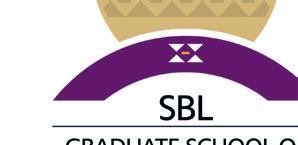


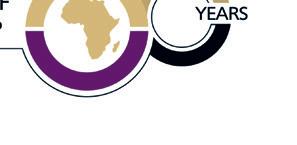
THAMI KAUNDA of the Unisa Graduate School of Business
Leadership
Heavy traffic, smog and cold weather – these are typical Johannesburg mornings that demand the kind of determination fuelled by a deep desire to make a positive difference. Such determination drove two brilliant financial accounting lecturers from Unisa’s Graduate School of Business Leadership (SBL) into the heart of Johannesburg, where they joined colleagues from Unisa’s College of Economic and Management Sciences and the Office of the Vice-Principal for Teaching, Learning, Community Engagement and Student Support. Their mission: to empower over 100 youth tourism ambassadors and 50 small, medium and micro enterprises (SMMEs) with essential financial and business management skills.
During Women’s Month, we pay tribute to Lize Terre Blanche CA(SA), MPhil Accounting Sciences) and Florence Mamaregane (MBA), a skilled tag team teaching financial accounting across three programmes: the Postgraduate Diploma in Business Administration (PGD), Master of Business Administration (MBA) and Master of Business Leadership (MBL). Together, they expertly guide over 500 students each year through this notoriously challenging subject area, using innovative synchronous and asynchronous teaching methods. It is no surprise that, in addition to their daily teaching commitments, they embarked on this impactful community engagement project with vigour and enthusiasm.
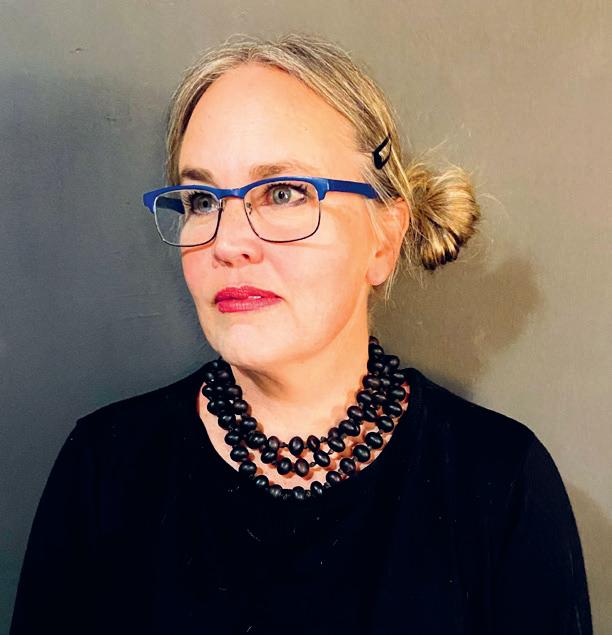
The Youth and SMME Community Training initiative, a Unisa community engagement project undertaken in collaboration with the City of Johannesburg (CoJ), ran over six months in 2025. This initiative was aimed at promoting youth skills development. Youth participants in the programme – referred to as tourism ambassadors – received intensive three-day training in business administration, personal finance and workplace effectiveness from the Unisa team. The project also supported SMMEs with business interventions, including marketing, legal compliance, facility grading and skills training for tour operators and guides.
Of the 102 youth participants, just over 70 were women from townships, such as Diepsloot, Soweto, Alexandra and Orange Farm, with 80 per cent holding Grade 12 as their highest qualification. They came not only with a hunger to learn, but also with the hopes and dreams of their families and communities for a better future. Anyone familiar with these areas can attest to the urgent need for youth skills development to combat the high unemployment rate in townships.
The high participation rate among women was not unexpected, given that women in South Africa bear the brunt of unemployment and its associated risks. Several studies have highlighted the link between economic vulnerability and women’s exposure to gender-based violence. It is hoped that this initiative has provided participants –particularly the women – with the skills and knowledge to pursue employment in the tourism sector and to empower themselves towards self-sufficiency.
“The lectures were full to capacity. Participants were actively involved as we used very practical examples they could relate to. They could imagine themselves drawing up income and expenditure statements and budgets for their small operations,” explains Florence Mamaregane.
“It was a wonderful initiative with over a hundred attendees and was quite a vibe!” adds Terre Blanche.

Once again, Unisa has solidified its position as an institution with its finger firmly on the pulse of society’s needs. As an engaged university, Unisa actively promotes community engagement and outreach in line with its mission and values, mobilising resources and programmes to drive meaningful change in the lives of community members.
As a college and business school within Unisa, the Graduate School of Business Leadership shares this commitment to uplifting communities through impactful collaborations like the Unisa-CoJ Youth and SMME Community Training initiative. During a month dedicated to honouring South African women, SBL is proud to have been represented in this important endeavour by two formidable women: Florence Mamaregane and Lize Terre Blanche. Phambili, makhosikazi ase Unisa SBL, phambili (forward, women of Unisa SBL, forward)!

VISIT WEBSITE
SCAN THIS QR CODE TO GO TO THE UNISA WEBSITE For more information: +27 11 652 0248 / +27 11 652 0291 sbl@unisa.ac.za www.unisa.ac.za
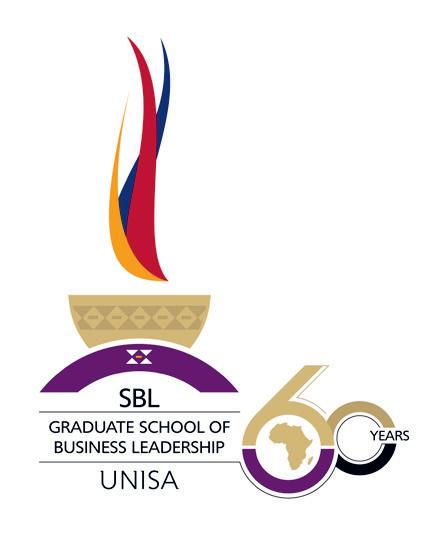
As the BUSINESSWOMEN’S ASSOCIATION OF SOUTH AFRICA marks a historic milestone, it recommits to being a powerful catalyst for change, a trusted partner in economic transformation and an enduring voice for women in business and leadership
In 2025, the Businesswomen’s Association of South Africa (BWASA) will commemorate a dual milestone – 45 years since the organisation’s founding through amalgamation in 1980, and 25 years since it was formally named BWASA in 2000. This anniversary marks more than a timeline of institutional growth – it is a celebration of legacy, a recommitment to purpose and a call to collective action.
For nearly half a century, BWASA has stood as a pillar of advocacy, empowerment and advancement for women across South Africa’s complex and ever-evolving business landscape. From the boardroom to the town hall, from small, medium and micro enterprises to blue-chip corporates, BWASA has ampli ed women’s voices, unlocked opportunities and shaped the national conversation around economic inclusion, gender parity and transformative leadership.
“This moment is not just about celebrating the past. It is about shaping the future,” says Mandisa Nkwanyana, president of BWASA. “We honour the women who led before us, the bold leaders of today and the next generation of businesswomen. BWASA is reaf rming its role as a catalyst, a strategic partner and a leading voice for women’s economic advancement in South Africa.”
BWASA’s journey began with the amalgamation of various regional women’s business networks in 1980. What started as a collective space for businesswomen to convene and collaborate has since grown into one of the country’s most respected and credible platforms for advancing women in business, leadership and entrepreneurship.

In the decades since then, BWASA has become a vital voice in shaping the policy and business landscape for women. Whether advocating for women-friendly procurement policies, lobbying for gender-balanced leadership or driving capacity-building initiatives, the association has never wavered in its mission to see women thrive across all sectors of the economy.
Its landmark Businesswoman of the Year Awards (BWOYA) – a prestigious annual

recognition event – has played a critical role in elevating exceptional South African women, from corporate executives and entrepreneurs to trailblazing professionals in male-dominated industries. The winners of BWOYA stand not just as individual achievers, but also as symbols of what is possible when talent, tenacity and access intersect.
Over the years, BWASA has been helmed by visionary leaders – women whose impact extends far beyond their tenures. They have steered the organisation with purpose through shifting political landscapes, economic headwinds and social reckonings. Each woman who has served as president, board member or regional chair has contributed to BWASA’s long-standing legacy of excellence, integrity and collective empowerment.
The list of BWOYA alumni reads like a directory of South African excellence – CEOs, innovators, change-makers, philanthropists – each one a testament to what empowered women can achieve. They serve not only as role models, but also as mentors, sponsors and ecosystem builders for the rising tide of women following in their footsteps.
“Our legacy is written in the stories of the women we’ve uplifted,” says Nkwanyana. “However, our responsibility is to ensure these stories multiply. That’s why we are recommitting to deep, systemic and sustainable change.”
As South Africa continues to grapple with layered socioeconomic challenges –unemployment, inequality, access to capital, gender-based violence and digital exclusion – the business environment remains deeply unequal. Women, especially black women, remain under-represented in leadership, underfunded in entrepreneurship and undervalued in boardrooms.


The numbers tell the story. While progress has been made, women still occupy less than 30 per cent of executive and board positions in many sectors.
Women-owned businesses remain the most vulnerable to economic shocks, with limited access to markets, funding and digital tools.
Yet, amid these realities, women-led businesses continue to
demonstrate remarkable resilience, innovation and impact. From fintech to fashion, renewable energy to agritech, South African women are at the forefront of redefining industries and shaping inclusive growth models.
“OUR LEGACY IS WRITTEN IN THE STORIES OF THE WOMEN WE’VE UPLIFTED. HOWEVER, OUR RESPONSIBILITY IS TO ENSURE THESE STORIES MULTIPLY. THAT’S WHY WE ARE RECOMMITTING TO DEEP, SYSTEMIC AND SUSTAINABLE CHANGE.”
– MANDISA NKWAYANA
Looking ahead, BWASA is not just reflecting; it is repositioning. Under Nkwanyana’s leadership, the organisation has set a bold agenda aimed at catalysing real, measurable transformation by 2030. The priorities?
• Economic and financial inclusion.
• Skills development and capacity building.
• Boardroom parity and gender-balanced leadership.
• Sustainable, women-led enterprise development.
• Advocacy for policy reform and implementation.
• Strategic partnerships across public, private and civil society.
At the heart of this strategy is a belief in co-creation – that the future must be built not just by women for women, but in collaboration with government, business, civil society and academic institutions.
“We are calling on all sectors – public and private – to see BWASA not just as an organisation, but as a strategic ally in building a more inclusive economy,” Nkwanyana states. “We want to see women equitably represented in procurement pipelines, on boards, in tech innovation hubs and across the green economy. We want to move beyond representation to real power and participation.”
BWASA’s vision for Boardroom Parity by 2030 is ambitious – but necessary.
“I am Truida Prekel. I can be described in many ways: South African woman, Afrikaans-speaking (though I mostly speak English professionally, and occasionally German). At age eighty-two, I work as an innovation and change facilitator in communities and in women’s advancement.
“My purpose is to make the world around me a better place by building bridges of mutual understanding and respect and sharing the unique SynNovation skills for collaborative creative problem-solving to address the many problems we have in South Africa.
“I think my greatest accomplishment is my work over almost six decades to help create opportunities for women of all levels and backgrounds and to build relationships across race, age and gender difference. I have received various awards, including the Four Outstanding Young South Africans (FOYSA) Award in 1979 and the UNISA SBL gold medal as the top student in the Master of Business Leadership in 1977. However, the real reward is seeing people change and grow, smile
This goal is not just about numbers. It is about reshaping corporate culture, diversifying decision-making and ensuring women’s perspectives influence the future of industries.
The call to action is clear: businesses must do more than pledge diversity. They must embed gender equity into their systems, metrics and incentives. Government must lead with inclusive policy. Investors must fund with a gender lens. And, women across generations must continue to show up, speak out and lead boldly.
As BWASA marks this historic moment, it does so with a deep sense of purpose and partnership. It invites:
• Women in business and leadership to connect, collaborate and lead with the organisation.
• Public sector departments to partner in delivering inclusive policies.
• Private sector companies to co-invest in women-led enterprises and inclusive leadership pipelines.
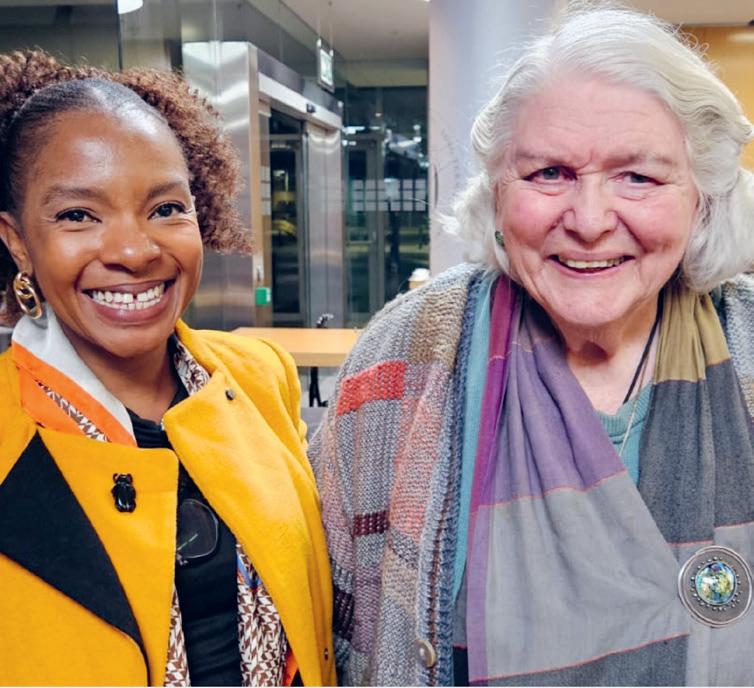
and laugh more or hearing decades later that something I shared or said made a lasting difference.
“A special contribution is that the BWA grew from the work I did and the workshops I held at UNISA SBL from 1977 to 1981. In that way, with many other women leaders and role models, over almost forty-five years, this women’s association has affected the lives of thousands of women (and I believe hundreds of men) positively.”
• Civil society and academia to co-create new knowledge and tools that enable systems change.
The road ahead is long, but it is full of possibilities. “BWASA stands ready,” concludes Nkwanyana. “Ready to lead, ready to partner and ready to deliver. We are not just looking at forty-five years behind us; we are looking at forty-five years ahead. The legacy continues, and the future is ours to shape.”
Gauteng - Johannesburg
Western Cape - Cape Town
Eastern Cape - Gqebhera
Limpopo - Polokwane
